












































BEHIND THE DEAL What led to Carolinas-based Nexsen Pruet joining Alabama firm PAGE 5 February 2023 | $8.50 | nclawyersweekly.com VOLUME 35 NUMBER 2 IN DIGITAL. IN PRINT. IN PERSON. Expertly Focused On Today’s Legal Professional. WEEKLY COLLABORATIVE EFFORT Ashley-Nicole Russell’s work leads to a Nobel Peace Prize nomination for the International Academy of Collaborative Professionals PAGE 8
Shumaker
Wake Forest
Olivia Osburn talks
pro bono work, health
the justice gap
14
5 QUESTIONS WITH
attorney and
grad
about
law and
PAGE




NEW Law Practice Management Services Erik@lawyersmutualnc.com 919.447.3352 www.lawyersmutualnc.com Free for insureds, Lawyers Mutual is pleased to now offer Law Practice Management Services, led by LPM Advisor, Erik Mazzone. Our goal is to help insureds operate more efficiently and with less risk. Erik and the LPM Program are here to help our insureds with • legal technology • law firm management • firm start-ups • and more! LML insureds can work one-on-one with Erik by phone, video or email. As an added benefit of Lawyers Mutual coverage, insureds may have three consultations with Erik annually at no cost, which provides a substantial value to our insureds. Contact Erik today or schedule an appointment online by visiting our website. We are more than an insurance company; we are your law partner.
IN PRINT. IN DIGITAL. IN PERSON. Expertly Focused On Today’s Legal Professional.
130 North McDowell Street, Unit B, Charlotte, NC 28204 (704) 377-6221 • FAX(704) 377-4258
E-mail: service@bridgetowermedia.com • Circulation: 1-877-615-9536
Executive Vice President of Media and Senior Group Publisher
Liz Irwin, lirwin@bridgetowermedia.com
n EDITORIAL
Interim Editor
Jason Thomas jthomas@scbiznews.com
Reporter
Haviland Stewart hstewart@nclawyersweekly.com
Digital Media Manager
Scott Baughman sbaughman@mecktimes.com
n CIRCULATION
Audience Development Manager
Disa Ehrler
dehrler@bridgetowermedia.com
Circulation
1-877-615-9536
service@bridgetowermedia.com
n ADVERTISING
Advertising Account Executive
Sheila Batie-Jones sbatie-jones@nclawyersweekly.com
n ACCOUNTING & ADMINISTRATIVE
Business Manager
Michael McArthur mmcarthur@bridgetowermedia.com
n ART & PRODUCTION
Creative Director
Melanie Bingham
Project Management
Jordan Mazuranic
Production Specialist
John Reno
Director of Production Services
Bradley Redmond
to: North Carolina Lawyers Weekly, Subscription Services, P.O. Box 1051, Williamsport, PA, 17703-9940
To place orders, temporarily stop service, change your address or inquire about billing: Phone: (877) 615-9536
Email: service@bridgetowermedia.com
COVER STORY: MUSIC AND MERGERS
p5 | A friendship forged by love of music leads to Carolina-based Nexsen Pruet joining Alabama firm
LETTER FROM THE EDITOR
p3 | You talked. We listened.
POSTMASTER - Electronic Service
Requested. Send address changes
To submit subscription payments, mail: Subscription Services P.O. Box 1051 Williamsport PA 17703-9940
©2023 BridgeTower Media. Material published in North Carolina Lawyers Weekly is compiled at substantial expense and is for the sole and exclusive use of purchasers and subscribers. The material may not be republished, resold, recorded, or used in any manner, in whole or in part, without the publisher’s explicit consent. Any infringement will be subject to legal redress.
BridgeTower OpCo, LLC d/b/a North Carolina Lawyers Weekly Media is an equal opportunity employer.
FEATURE
p8 | Ashley-Nicole Russell’s collaborative law work has led to a Nobel Peace Prize nomination for the International Academy of Collaborative Professionals
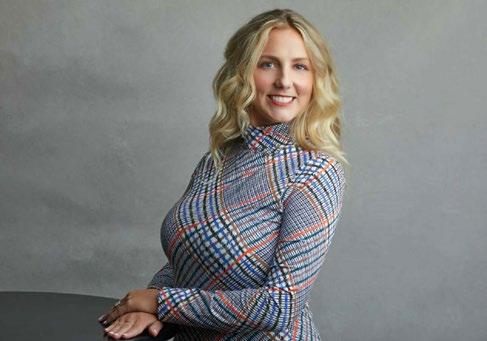
COURTS
p10 | 4th Circuit case revolves around First and Fourth Amendment rights
5 QUESTIONS WITH p14 | Shumaker attorney Olivia Osburn
OPINIONS
p16 | Highlights of Court of Appeals opinions
POWER LIST PERSONAL INJURY
p18 | Meet difference makers in the field of personal injury
COMMENTARY
p25 | How employees can prepare for a non-compete ban
VERDICTS & SETTLEMENTS
p27 | The latest results on North Carolina legal action
LAWYERS IN THE NEWS
p32 | A roundup of personnel news at North Carolina firms
COMMENTARY
p34 | North Carolina goes to Washington
NORTH CAROLINA LAWYERS WEEKLY | FEBRUARY 2023 3
CONTENTS
WWW. NCLAWYERSWEEKLY.COM NCLAWYERSWEEKLY North Carolina Lawyers Weekly [ISSN10411747] [USPS 002-904] is published Monthly with General Statewide
for $410.36 per year by North
130 North
Street, Unit B,
paid
Circulation
Carolina Lawyers Weekly,
McDowell
Charlotte, NC 28204 Periodicals postage
at Charlotte, North Carolina 28228-9998.
Voicing an opinion about opinions
You’ve spoken, and we’ve listened.
In this second issue of the reimagined North Carolina Lawyers Weekly, you’ll notice two pages of opinion digests. You’ll also notice a note about finding the full list of digests online.
This came about after hearing from you, our readers. By far the biggest concern you had with the redesign was the lack of opinion digests. This was something that we thought about a great deal prior to the relaunch.
Unfortunately, with us moving to a monthly print schedule, it would be impossible to include the full list of digests in the print edition. Which is why we will select some noteworthy opinions to be included in each issue. Please be assured that all digests will always be available online.
Speaking of Version 2.0, in this edition’s cover story you’ll find reporter Haviland Stewart’s look at the merger between Carolinas-based Nexsen Pruet joining an Alabama firm to create a nationwide practice. The roots of the deal might have you tapping your toes.
You’ll also read about how attorney Ashley Nicole Russell’s work has led to a Nobel Peace Prize nomination for the International Academy of Collaborative
Professionals, as well as a 4th U.S. Circuit Court of Appeals case involving First and Fourth Amendment rights.



And be sure to check out the 5 Questions With chat with attorney Olivia Osburn, who talks about pro bono work, health law and the justice gap. You’ll also find Verdicts and Settlements inside and a roundup of personnel moves from firms across the state.
That several of you reached out about the redesign reaffirmed my belief in the importance of North Carolina Lawyers Weekly, and what it means to you.
I look forward to making it better with each edition.
Jason Thomas is the interim editor of North Carolina Lawyers Weekly. Reach him via email at jthomas@scbiznews.com.
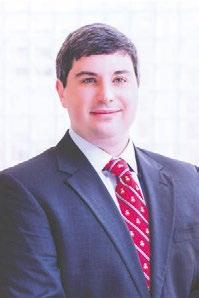
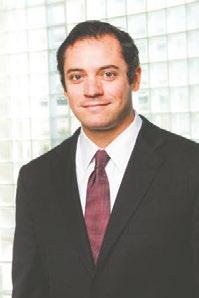





4 FEBRUARY 2023 | NORTH CAROLINA LAWYERS WEEKLY
NEWS LETTER FROM THE EDITOR
We are very pleased to announce that Hunt Willis and Steven Corriveau have been named shareholders in the firm. Martin & Jones has been representing North Carolinians since 1982. Offices in Raleigh, Durham and Wilmington. 800.662.1234 MartinandJones.com 4140 Parklake Ave., Suite 400 Raleigh, NC 27612 Medical Malpractice Serious Personal Injury Workers’ Compensation Tractor Trailer Collisions Mesothelioma & Asbestos Diseases Dangerous & Defective Products Class Actions Vaccine Injuries Practice Areas
MUSIC AND MERGERS
At the first strum of the ear-splitting electric guitar, Cannery Hall erupted with life. Leighton Lord maneuvered through the sea of fans, inching closer to the stage as Jason and the Scorchers mesmerized all of Nashville. As the beat pulsed through him, Lord spotted a familiar face intermittently illuminated by the strobe lights – a classmate he knew as Jeff Grantham.
It was 1986, and Lord and Grantham, who were both newly enrolled at Vanderbilt Law School, immediately bonded over their love for music. For the remainder of their academic careers, the two remained
close friends. When they grew tired of studying, they marched out of the law school library and headed for the nearest music venue.
Prior to graduating and moving to different states to begin their law careers in 1989 they soaked up all the music they could, seeing iconic groups including Guadalcanal Diary, John Hiatt, REM, Love Tractor, and The Grateful Dead live in concert.
Little did they know that nearly 33 years later, the two executives would lead the merger of two law firms to create a practice that would have 23 offices coast-tocoast.
In 2018, after almost 30 years of
limited contact, Lord picked up the phone to congratulate Grantham on being elected managing shareholder of Maynard Cooper & Gale.
For the next two years they sporadically sought each other’s council regarding firm maters. In 2020 when the onset of COVID-19 swept uncertainty across the nation, they turned to each other once again.

“When COVID hit, Jeff and I really started talking a lot,” Lord said.
“‘What are you doing? Are you closing down your offices? What’s your mask policy?’ all those kinds of things. We started this dialogue,
NORTH CAROLINA LAWYERS WEEKLY | FEBRUARY 2023 5
COVERNEWSSTORY
See Page 6
A friendship forged by love of music leads to Carolina-based Nexsen Pruet joining Alabama firm
B y H aviland S tewart • hstewart @ nclawyersweekly . com
Continued From Page 5
really about helping each other become good managing partners, and then through that dialogue, we started to become very fond of each other’s law firms.”
Nearly five years after the rekindling of their friendship, they announced a major merger between their two law firms.
On Jan. 5, 2023, Alabama-based Maynard Cooper & Gale, and Carolinas-based Nexsen Pruet announced that they would be merging, operating under the name Maynard Nexsen effective April 1, 2023.
“We didn’t go into this conversation like, ‘hey, let’s merge,’” Grantham said. “It was just interactions that got to the point where we realized, ‘gosh, our firms seem very compatible.’”
According to Lord and Grantham, the initial idea of the merger was sparked by discovering the congruency of each firm’s culture and client-centric focus.
“We weren’t going to do anything like this if it sacrificed the culture
Locations
ALABAMA
Birmingham
Huntsville
Mobile
Montgomery
CALIFORNIA
Los Angeles
San Francisco
FLORIDA
Miami
Orlando
GEORGIA
Atlanta
IOWA
Des Moines
NEW YORK
New York
that we think is very important to being successful,” Lord said. “By finding a firm like Maynard, where we felt like we had a shared culture, and we could create a better firm. That’s why our partners were unanimous in saying, ‘let’s do this,’ it was the culture.”
As a combined firm, Maynard Nexsen will bring together more than 550 lawyers operating out of 23 offices across the United States.
The Maynard Nexsen leadership team combines staff from both original firms. Grantham, managing shareholder of Maynard Cooper & Gale, will serve
NORTH CAROLINA
Charlotte
Greensboro
Raleigh
SOUTH CAROLINA
Charleston
Columbia
Greenville
Hilton Head/Bluffton
Myrtle Beach
TENNESSEE
Nashville
TEXAS
Austin
Dallas
WASHINGTON D.C.
as CEO and managing shareholder of Maynard Nexsen. Lord, chairman of Nexsen Pruet, will serve as president and chief strategy officer of the combined firm. Greg Curran, chairman of Maynard Cooper & Gale, will serve as chairman of the board and head of client relations for Maynard Nexsen.


The original Maynard Cooper & Gale was the larger of the firms, with 350 attorneys operating out of 15 offices nationally. While Nexsen Pruet was one of the largest firms in the Carolinas, it was the smaller of the two companies, with 200 attorneys working out of eight offices, primarily in the Carolinas.
Both firms had more of a presence in the South, however, they only had location overlap in their entire footprint. This gives Maynard Nexsen a strong platform for major geographical reach without the inefficiencies of operating multiple offices out of the same city.
According to the Lord, is a priority to the leadership team to pull strengths from each original firm to
See Page 7
6 FEBRUARY 2023 | NORTH CAROLINA LAWYERS WEEKLY
COVERNEWSSTORY
23 OFFICES
FROM COAST TO COAST
Leighton Lord
Jeff Grantham
Continued From Page 6
adopt to Maynard Nexsen.
“At the very beginning and we said, ‘We’re going to create a new law firm, and the new law firm is going to be better than its constituent parts,’” Lord said. “That’s been one of the extremely unique things about this process.”
For the past few months, the leadership team for Maynard Nexsen has been assessing which areas each firm is excelling in, to ensure the best practices are applied to the new firm.
“Maynard has developed a great public securities practice, a great cyber practice, and a great governmental contracts practice, which are three things that the Carolinas really need more of,” Lord said. “Because we have such deep Carolina roots, we can help give Carolina-based companies those services now.”
The Maynard Nexsen team is excited to be able to offer their clients additional capabilities, expertise and geological reach after this merger goes into effect. According to Lord and Grantham, after the initial launch of the new firm, Maynard Nexsen plans to grow within its established footprint, rooting itself in growing markets including Charlotte and Austin. They are confident that the uniqueness of their firm will be attractive to clients and want to be able to provide legal service to all who need it.
A friendship that was forged by a mutual love of music will soon take center stage with the leadership of a newly created law firm with a national scope.
“Although we will have a heavily dominated presence in the Southeast, from the Carolinas through to Alabama, we are a national firm, and we are focused on that,” Grantham said. “We’re going to certainly go where the clients need us.”
Open Associate Attorney Position in Rutherfordton
Arledge Law Firm in Rutherfordton, NC is seeking a talented Associate Attorney to join our team. We are a wide-ranging general practice that concentrates in real estate transactions and estate administration. We also have a busy courtroom practice in proceedings before the clerk, criminal defense in District and Superior Court, and domestic and civil litigation in District and Superior Court.
We are presently a 2-attorney law firm with a full time support staff of 7 legal assistants, and looking to add at this time one associate attorney. In particular, we are seeking an attorney who wants to learn all aspects of a general practice but has a special interest in handling courtroom matters. Interested applicants should be admitted to the North Carolina bar, and while all applicants shall be duly considered, 2-3 years experience as a licensed attorney is preferred. There is also significant room for growth for motivated attorneys.
Rutherfordton is a beautiful small town in the foothills, halfway between Asheville and Charlotte. Candidates for this position should be interested in living and working in a small-town setting.
For more information about Arledge Law Firm, please visit https://www.arledgelegalnc.com/.
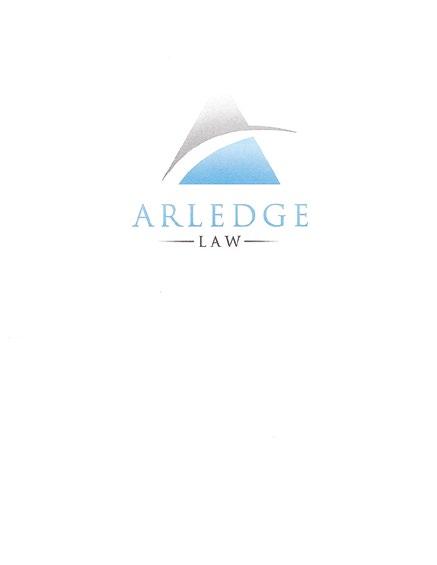
Salary & Benefits
Starting salary for this position is commensurate with qualifications, with a range of 60K - 80K.
Arledge Law Firm offers paid health insurance and paid vacation.
How to Apply
If interested, send resume and cover letter via email to Jarald Willis, Managing Attorney of the Arledge Law Firm, at iwillis@arledgelawfirm.com. We are considering applications on a rolling basis.
NORTH CAROLINA LAWYERS WEEKLY | FEBRUARY 2023 7
At the very beginning and we said, ‘We’re going to create a new law firm, and the new law firm is going to be better than its constituent parts. That’s been one of the extremely unique things about this process
- Leighton Lord
COVERNEWSSTORY
COLLABORATIVE EFFORT
Ashley-Nicole Russell’s work has led to a Nobel Peace Prize nomination for the International Academy of Collaborative Professionals

As a child, watching helplessly as the fabric of her family unraveled with xAshley-Nicole Russell decided that she would change the way divorce was handled in America.
Present day, Russell has over a decade of experience as a family law attorney based in Greenville, N.C. She has never again set foot inside a courtroom for family law matters.
Throughout her professional career,
Russell chose to forgo the path of traditional litigation and immerse herself in the world of collaborate law — focusing on keeping the family unit intact while going through divorce proceedings. Russell is now an award-winning attorney, owner of several North-Carolina based law firms, author of “The Cure for Divorce Culture,” and host of the “Divorce, Healthy!” podcast.
Russell began her involvement with
the International Academy of Collaborative Professionals organization (IACP), in 2011, and has since revolutionized the practice of collaborative law in North Carolina.
Throughout Russell’s time as a collaborative professional, she has seen IACP’s members grow from 100 to 2,200, as collaborative law gained traction across the globe. On Jan. 4,
See Page 9
8 FEBRUARY 2023 | NORTH CAROLINA LAWYERS WEEKLY
B y H aviland S tewart • hstewart @ nclawyersweekly com
FEATURE
Ashley-Nicole Russell is at the forefront of collaborative law. Photo/Provided
Continued From Page 8
2023, Russell announced that IACP has been nominated for a Nobel Peace Prize for its international efforts in collaborative law.

“It’s just amazing, because when collaborative started, there were a lot of naysayers,” Russell said. “Now, to be here and see that it did produce the results is just really beautiful.”
Collaborative law focuses on resolving legal disputes within families while staying out of court. The collaborative approach doesn’t just involve lawyers but also includes mental health and financial professionals to support and educate clients throughout the process.
Throughout her career, Russell has been able to use her experience as a child of a traditional divorce, to provide the perspective of and advocate for children with separating parents.
According to Russell, statistics show that children who watch their parents undergo traditional divorce proceedings are more likely to experience fear of commitment, emotional immaturity and financial instability
we’ve seen lead to healthy adult children out of divorce. Studying the change in what adulthood looks like for children of a families who choose collaborative divorce has been really
who choose the route of traditional litigation.
“It doesn’t make sense to have two different people competing against each other to create a solution for a family, because a family has to have connection and respect,” Russell said. “The role of the law format is to pit one side against the other, so when you try to place the family unit in the civil world of law, the family struggles.”
Collaborative law focuses on removing families from the litigative process, understanding communication practices and psychology that go into conflict resolution, and in turn, has yielded many positive results for families, and has now received global recognition for its impact through IACP’s nomination of a Nobel Peace Prize.
well into their adult years, increasing likelihood of suicide, divorce, and substance abuse.
“Collaborative allows families to settle their disputes out of court and maintain that respect,” Russell said. “The respect within the family is what
beautiful. We’re making a generational change around how families proceed after the divorce is done.”
According to Russell, the law system is not designed to take on family matters and tends to cause a significant amount of turmoil in families
“It is something that people were very drawn to and wanted and needed,” Russell said. “It created members of society on the other side of divorce that were still happy and healthy and on the same side of the ball field. People saw that. They saw that it was different, and amazing.”
NORTH CAROLINA LAWYERS WEEKLY | FEBRUARY 2023 9
FEATURE
Ashley-Nicole Russell, left, with Lori Gephart, the former president of the International Academy of Collaborative Professionals organization. Photo/Provided
Studying the change in what adulthood looks like for children of a families who choose collaborative divorce has been really beautiful. We’re making a generational change around how families proceed after the divorce is done.
- Ashley-Nicole Russell
4th Circuit: No implied right to record TSA agents
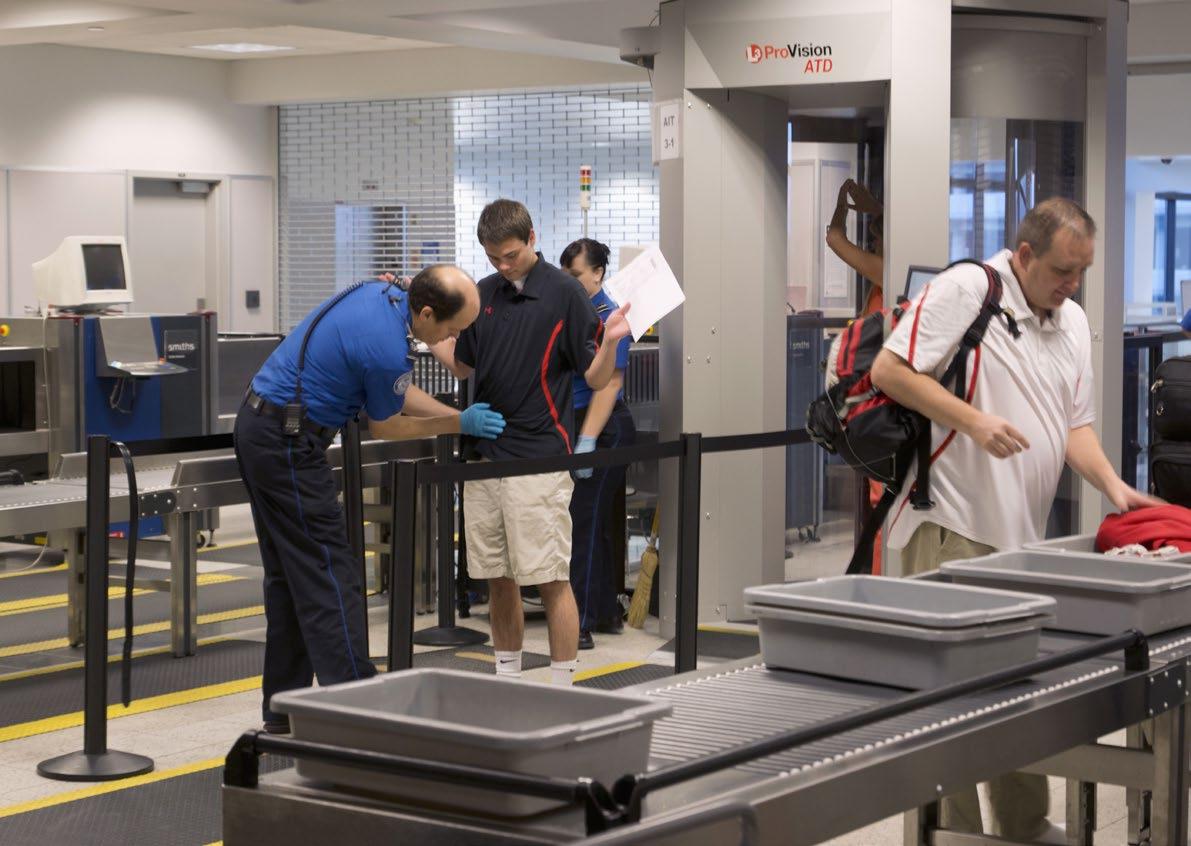
Alower court’s recognition of a new cause of action against Transportation and Security Administration, or TSA, officers who seized a man’s cell phone and prohibited him from recording his husband’s pat down at an airport has been grounded by the 4th U.S. Circuit Court of Appeals.
Claiming violations of his First and Fourth Amendment rights, the plaintiff successfully urged the Eastern District of Virginia to expand the narrow list of private causes of action against federal officials implied under 42 U.S.C. § 1983, known as
Bivens actions.
But the Fourth Circuit disagreed.
“As ‘even a single sound reason to defer to Congress’ will be enough to require the court refrain from creating a Bivens remedy, we decline to extend an implied damages remedy pursuant to Bivens against Appellants based on the existence of an alternative remedial structure and/or the interest of national security,” Judge Stephanie D. Thacker wrote. “And since Appellee has presented no cognizable claim for damages, we need not address Appellants’ qualified immunity
defense as to Appellee’s First Amendment claim.”
Thacker’s decision in Dyer v. Smith, (VLW 022-2-275) was joined by Judges Albert Diaz and A. Marvin Quattlebaum Jr.
Security checkpoint
In June 2019, Dustin Dyer was preparing to board a flight with his husband and their children at Richmond International Airport. Dyer and the children cleared the security checkpoint. His husband, however, did not;
See Page 11
10 FEBRUARY 2023 | NORTH CAROLINA LAWYERS WEEKLY
B y n ick H ur S ton COURTS
A 4th U.S. Circuit Court of Appeals case centers on First and Fourth Amendment rights. DepositPhoto
he was carrying infant formula that couldn’t be opened.
The TSA said Dyer’s husband needed to submit to a pat-down search. Dyer began video recording the search with his cell phone from about 10 feet away. After about a minute, a TSA officer approached Dyer and told him he was impeding their job.
When Dyer asked, “What are you talking about?” a TSA supervisor confirmed that he wasn’t allowed to record. Dyer stopped and then complied with their demand to delete the video.
Dyer and his family made their flight. He was later able to recover the deleted video.
Right to record
Dyer filed suit in December 2019, alleging that the TSA officers violated his First Amendment rights when
they demanded he stop recording and delete the video. He also claimed that the TSA seizures of his husband and cell phone violated his Fourth Amendment rights.
The government moved to dismiss, but the district court found that no special factors counseled against recognizing implied damages remedies for Dyer’s claims.

The lower court held that qualified immunity didn’t protect the defendants because Dyer had a clearly established right to record government officials performing their duties.
The government sought interlocutory appeal.
New context
Thacker explained that Congress created a private cause of action for damages against a state official who violates an individual’s constitutional rights — but not against federal officials.
In 1971, though, the U.S. Supreme Court created an implied cause of action against federal officials in Bivens v. Six Unknown Named Agents of the Federal Bureau of Narcotics. Under Bivens, a federal court has the “authority to imply a new constitutional tort, not expressly authorized by statute,” the judge said.
“But this authority is rarely invoked: in the 50 years since Bivens was decided, the Supreme Court has recognized only two additional contexts in which an individual may pursue damages against federal officials for violating the individual’s constitutional rights,” Thacker noted.
The first step in determining whether Bivens provides a remedy is to ask “‘whether a given case presents a new Bivens context,’ i.e., whether it is ‘different in [any] mean-
See Page 12
NORTH CAROLINA LAWYERS WEEKLY | FEBRUARY 2023 11
Continued From Page 10 COURTS Has your client identified fraud against the government? Partner with us. ★ ★★ ★★ “Bill Nettles is extremely effective as an advocate for his clients. You will be glad you brought your qui tam case to Carolina Whistleblower Attorneys.”
Nettles Former U.S. Attorney who leads our formidable team. We’re led by a former U.S. attorney who helped lead the nation in whistleblower recoveries. ✓ Experience We have the resources to invest in cases and maximize value. ✓ Resources You can be as involved in the case as you want to be. ✓ Flexibility carolinawhistleblower.com • 1-866-533-6743
Bill
Continued COURTS
ingful way from the three cases in which the [Supreme] Court has recognized a Bivens remedy.”
Neither party disputed and the court agreed that Dyer’s claims presented new Bivens contexts.
‘Special factors’
The next step required the court to consider if there are any special factors that might encourage hesitation in expanding Bivens remedies, Thacker said.
“In considering the special factors, we evaluate ‘whether Congress might doubt the need for an implied damages remedy,’… or if there is ‘reason to pause’ before extending Bivens to new contexts,” the judge wrote.
“Put another way, ‘the most important question is who should decide whether to provide for a damages remedy, Congress or the courts?’” she said citing 2022’s Supreme Court precedent in Egbert v. Boule.
The Supreme Court hasn’t provided a complete catalogue of special factors, so courts must consider “‘whether the judiciary is well suited, absent congressional action or instruction, to consider and weigh the costs and benefits of allowing a damages action to proceed [and] whether ‘there is an alternative remedial structure present in a certain case.’”
Thacker added that an alternative remedy weighs against expanding Bivens even if it’s less effective or isn’t expressly identified by Congress as an alternative.
But National security is a special factor to ponder.
Thacker said the district court erred by holding that the Travelers Redress Inquiry Program, or TRIP, didn’t provide an alternative remedy.
She acknowledged that Dyer wasn’t identified as a threat or delayed, and that it wasn’t clear if he could file a complaint through TRIP.
But that was the wrong query, she said.
“[T]he question is not whether TRIP maps neatly onto Appellee’s claim,” Thacker explained. “The question is whether Congress has acted or intends to act. And in this context, Congress has acted by establishing TRIP. While TRIP may not squarely address complaints by an individual similarly situated to Appellee, that silence does not give this court license to usurp Congress’s authority in an area where Congress has previously legislated.”
The Fourth Circuit hasn’t yet addressed a Bivens claim against TSA agents. But Thacker agreed with the Third Circuit’s rejection of extending a Bivens remedy based upon TSA’s role in national security.
“And although Appellee claims he did not pose a national security risk, it
is not our task to ask ‘whether Bivens relief is appropriate in light of the balance of circumstances in th[is] particular case,’” the judge said.
Finally, the judge said that “creating a cause of action against TSA agents could ‘increase the probability that a TSA agent would hesitate in making split-second decisions about suspicious passengers” or disturbances at security checkpoints.
“The nature and gravity of these risks, and whether they are outweighed by countervailing interests in judicial relief for passengers, make such a situation ill-suited to judicial determination,” she wrote.
‘Whims of Congress’
Los Angeles civil rights litigator Jonathan Corbett represented Dyer.
“This case crippled the Bivens doctrine, ending the self-executing nature of our founding document in nearly all cases, instead subjecting those guarantees to the whims of Congress,” he told Virginia Lawyers Weekly.
Shumaker partner named to national board
Shumaker Partner Karen H. Stiles has been appointed to the North Carolina Association of Defense Attorneys Board of Directors, where she previously served as the chair of its Medical Malpractice Committee, according to a news release.

NCADA is the resource for educational opportunities, networking, and information sharing among civil defense trial attorneys in the state, according to the release.
”Karen Stiles has been a valuable
and engaged member of the NCADA for years, and we are grateful to have the opportunity to work with her as a thought leader on our Board of Directors,” Ashley Brathwaite, president of the NCADA, said in the release.
tice for the last 20 years, Stiles’ practice is focused primarily on defending medical malpractice cases and catastrophic personal injury litigation, the release stated. She is a partner on the firm’s Medical Malpractice team in Charlotte.
Karen H. Stiles
Specializing in medical malprac-
“It is a privilege to have the opportunity to serve this organization that has provided so much guidance and wisdom to the defense bar over the years,” Stiles said in the release.
Staff report
12 FEBRUARY 2023 | NORTH CAROLINA LAWYERS WEEKLY
Corbett added that, “Last summer, the Supreme Court quite visibly destroyed abortion rights, but a lot more quietly limited our ability to enforce all of our Constitutional rights in the courts in Egbert v. Boule. Where there is a right, there must be a remedy, and we are considering our options at this time.” From Page 11








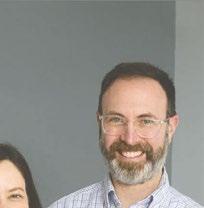




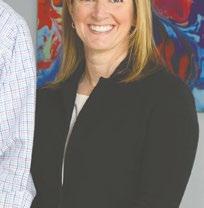




NORTH CAROLINA LAWYERS WEEKLY | FEBRUARY 2023 13
QUESTIONS WITH...
Olivia Osburn
Attorney Olivia Osburn was recently a recipient of the North Carolina State Bar Pro Bono Student Award for the legal services she provided to the community while attending Wake Forest University School of Law. Osburn served as the executive director of the Pro Bono Program, was a founding member of the Medical Legal Partnership Pro Bono Clinic and volunteered as a national eviction data analyst.
Osburn graduated summa sum laude from the University of Texas at Austin in 2019 with a degree in health and society. She graduated cum laude from Wake Forest University School of Law in 2022 where she focused on health care. In past summers, Osburn worked for the U.S. Attorney’s office and the General Counsel for the National Guard Bureau.
Most recently, Osburn was a summer associate in Shumaker’s Charlotte office, which prepared her well to step into her role as associate in Shumaker’s Health Care Service Line, where she primarily practices health law and medical malpractice matters.
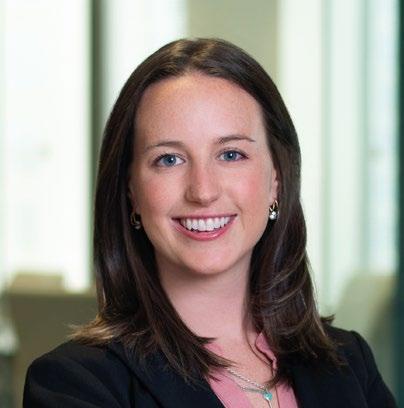
In the following Q&A, Osburn chats with North Carolina Lawyers Weekly about pro bono work, health law and the justice gap.
In the summer after my first year of law school, I became much more heavily involved in Pro Bono work, particularly in response to the eviction crisis the country was facing during the height of the COVID-19 pandemic. I began working on a project to inform tenants and landlords about the emergency laws being passed with respect to rent, utilities, and other housing costs. Through that work, I met Professor Emily Benfer, who is an extremely accomplished legal advocate, focusing on addressing and dismantling health justice barriers. When she began her employment at Wake Forest University School of Law, she offered me and three other students the opportunity to brainstorm, create, and develop a Medical Legal Partnership. A medical legal partnership is a system which finds legal solutions to health problems. Legal advocates and lawyers work alongside health care providers to detect, address, and prevent health-harming social conditions for people and communities. For exam-
ple, if a patient presents with symptoms of chronic respiratory distress, they are screened for housing quality issues. If their home has asbestos or mold in it, a member of the clinic can represent them to ensure their landlord performs abatement procedures. The Medical Legal Partnership began officially seeing patients in my third year of law school. Working with my clients and colleagues to see how the intersection between health and law can change a life was one of my most rewarding experience to date.
Q: What changes do you hope to see to in the legal field to work toward bridging the justice gap?
I believe that a legal education is a gift, and a privilege. Many of the injustices communities face today are due to lack of access to information. It’s not usually a complex legal case or procedural issue, but rather not knowing their rights or understanding the steps they need to take that might help address issues. Attorneys and legal professionals work hard to gain the knowledge they have, and I think we have a duty to share that knowledge with others and use it to better our neighborhoods, cities, states, country, and beyond. My hope is that the legal community
14 FEBRUARY 2023 | NORTH CAROLINA LAWYERS WEEKLY
Q: What drove you to spearhead the founding of the Medical Legal Partnership Clinic and serve as the Executive Director of the Pro Bono Program at Wake Forest University School of Law?
FEATURE
1
5
2
understands how the information they may take for granted can have such an important impact. I hope we can prioritize using our education to help empower those around us.
Q: What aspect of heath law initially intrigued you?
I received my undergraduate degree at the University of Texas at Austin, majoring in Health and Society, with a focus on food and nutrition access. Through this degree, I studied how health patterns, health behavior, medical care, and healthy policy differ across countries in both culturally and historically to determine how these factors impact the economy, education, and overall health of communities. I developed a specific interest in food insecurity when I worked for the Hunger
Free America Child Hunger Strategy campaign, and when I studied abroad in South Africa for an international dietetic field study. These experiences drove me to further pursue my passion for exploring the ever-growing implications of health care on our society through a legal lens.
Q: What are some ways you hope to continue improving access to legal resources for underserved communities throughout your career?
sion for service into others and expand the network of law students, attorneys, and legal professionals who can serve in pro bono roles. Further, I strive to improve the transparency and relationship between clients seeking services and advocates who are there to help. As we continue to build trust with communities that have faced injustices or are disproportionately impacted, I believe we can learn from each other and work towards a more equitable environment.
4 5 3 5535 Currituck Drive, Suite 210 Wilmington, NC 28403
While I’ve enjoyed personally serving the community through local pro bono experiences, I hope to develop a platform to inform others about the accessibility of pro bono opportunities. As I grow in my professional career, I would like to instill my pas-
Q: If you weren’t an attorney, what would you be doing for a living?
Our Wilmington O ce’s New Address Is We’ve Moved!
NORTH CAROLINA LAWYERS WEEKLY | FEBRUARY 2023 15 FEATURE
If I wasn’t an attorney, or when I’m not practicing anymore, I would like to open my own bakery or small grocery that also operates as a food pantry. www.cshlaw.com
Court of Appeals reverse’s trail court decision
Search & Seizure – Good Faith Exception – CSLI Historical Data –Statutory Order
A detective failed to show probable cause for an order to obtain defendant’s historical cellphone location data when he based his application on uncorroborated information from an anonymous source, who was not shown to be reliable. Moreover, there is no good faith exception to the exclusionary rule under the North Carolina Constitution.
We reverse the trial court’s denial of defendant’s motion to suppress. Defendant is entitled to a new trial.

A sheriff’s detective submitted an affidavit to Judge James Bell, along with an application for an order pursuant to 18 U.S.C. § 2703(d) to obtain defendant’s cell phone records, including geo-location.
Judge Bell granted the application.
The detective used phone company updates, provided in 15-minute intervals, to track defendant’s trip from Wilmington to Hayward, California, and back again. Defendant’s car was stopped and searched; officers found a trafficking quantity of cocaine.
Although § 2703(d) only requires a showing of “reasonable grounds” for issuance of an order thereunder, Carpenter v. United States, 201 L. Ed. 2d 507 (2018), ruled that probable cause was required before police could obtain historical cellsite location information (CSLI).
Given the five- to seven-minute delay in the detective’s receipt of location coordinates from the phone company, the CSLI provided to the detective was historical rather than real-time. Consequently, the detective was required to show probable cause to obtain such records.
Here, Judge Bell found probable cause, but we disagree. The detective’s affidavit was based entirely on information provided by a confidential informant (CI). The
detective corroborated only the fact that the phone number the CI provided was actually defendant’s phone number. The affidavit contains no assertion that the informant was reliable or had a history of providing accurate information.
The affidavit was based on the uncorroborated information of an anonymous source whose reliability was not established. Therefore, the detective’s application was not supported by probable cause, and the trial court issued its § 2703(d) order permitting law enforcement officers to obtain defendant’s historical CSLI data in violation of defendant’s constitutional rights.
In State v. Carter, 322 N.C. 709, 370 S.E.2d 553 (1988), our Supreme Court declined to adopt a good faith exception to the exclusionary rule as it exists under the North Carolina Constitution, noting that North Carolina adopted an exclusionary rule by statute rather than by judicial creation. The court left it to the General Assembly
To view the full list of opinion digests, please visit www.nclawyersweekly.com. See Page 17
16 FEBRUARY 2023 | NORTH CAROLINA LAWYERS WEEKLY OPINIONS
Continued From Page 16
to decide whether to adopt a good faith exception. Although the General Assembly has done so, our Supreme Court has not yet overruled Carter, and we remain bound by that decision to hold that there is no good faith exception to the exclusionary rule under our state constitution.
New trial.
State v. Rogers (Lawyers Weekly No. 012513-22, 26 pp.) (Valerie Zachary, J.) Appealed from New Hanover County Superior Court (Frank Jones, J.) Caden William Hayes for the state; Sterling Rozear for defendant. 2022-NCCOA-828
Court of Appeals vacates judge’s judgment
Civil Practice
Judges – Subject Matter Jurisdiction –Contrary Rulings – Landlord/Tenant
Between Judge Bradley Letts’ denial of the plaintiff-lessor’s motion for summary judgment and Judge Daniel Kuehnert’s grant of judgment for the lessor as a matter of law, the only significant change was the lessor’s assertion of a claim for compensatory damages. Judge Kuehnert lacked the authority to overrule Judge Letts’ order.
We vacate Judge Kuehnert’s judgment in favor of the lessor.
Background
A lease allowed lessee Ruth Owens, “or the survivor of the Lessee,” to live on a campground in exchange for maintaining the campground. The lease allowed Ruth’s children to live with her, and defendant William Owens did so. After Ruth became unable to maintain the campground, William took over her duties, at least for a time.
The lessor filed this action alleging defendants were in breach of the lease and seeking a declaratory judgment as to the rights of the parties under the lease. Ruth passed away.
The lessor moved for summary judgment. Judge Letts denied the motion.
The lessor amended its complaint to voluntarily dismiss its claims against Ruth and to assert a claim for compensatory damages against William. Thereafter, Judge Kuehnert granted summary judgment for the lessor.
Discussion
One superior court judge may not correct another’s errors, and ordinarily one judge may not modify, overrule, or change the judgment of another superior court judge previously made in the same action. A trial court judge has the authority to modify an interlocutory order only when there is a showing of changed conditions which warrant such action.
Judge Letts’ order definitively concluded that neither party was entitled to judgment as a matter of law regarding William’s rights in the lease. Judge Kuehnert considered this issue a second time and incongruously concluded, as a matter of law, that William did not have any rights in the lease.
The record reveals no change in circumstances that permitted Judge Kuehnert to reverse Judge Letts’ decision. Neither the lessor’s dismissal of its claims against Ruth nor its addition of a compensatory damages claim had any bearing on the legal issue of whether William had any rights in the lease. Because Judge Letts had concluded that the case could not be resolved as a matter of law, Judge Kuehnert did not have the authority to enter a contrary order.
William was not required to preserve for appeal his argument that Judge Kuehnert had no authority to overturn Judge Letts’ order. Judge Kuehnert’s authority to make a declaratory judgment is a question of subject matter jurisdiction, which may be raised at any time.
Vacated.
Adventure Trail of Cherokee, Inc. v. Owens (Lawyers Weekly No. 012-523-22, 10 pp.) (Jefferson Griffin, J.) Appealed from Jackson County Superior Court (Daniel Kuehnert, J.) Shira Hedgepeth for plaintiff; Mark Hayes for defendant. 2022-NCCOA850
Defendant’s motion granted in part Partnerships
Derivative Action – Not Permitted –Duplicative Claim
Plaintiff, a partner in the general partnership Hot Dog Shoppe, alleges that his partner, defendant Vojnovic, used the defendant limited liability company to usurp a partnership opportunity to buy three Ohio hot dog shops. Since plaintiff does not allege that he and Vojnovic agreed that either partner could assert derivative claims on behalf of their partnership, North Carolina law does not permit plaintiff to bring a derivative claim on behalf of the partnership.
Defendants’ motion for judgment on the pleadings is granted in part.
Although North Carolina’s statutes governing corporations, limited liability companies and limited partnerships allow interested parties to bring derivative actions, the North Carolina Uniform Partnership Act does not.
Unlike shareholders and limited partners, general partners all have the ability to act on behalf of the partnership, and all have management rights. Moreover, unlike corporate shareholders, officers and directors or an LLC’s members and mangers, partners in a general partnership owe one another fiduciary duties. Furthermore, the NCUPA creates an adequate remedy – a claim for an accounting – through which one general partner may pursue claims directly against another general partner to obtain both equitable and monetary relief through a balancing of accounts.
Under the circumstances, a derivative action is unnecessary. Plaintiff’s derivative claims are dismissed.
Where plaintiff asserts a claim for breach of fiduciary duty against Vojnovic, plaintiff’s claim against Vojnovic for misappropriation of business opportunity is unnecessarily duplicative and is therefore dismissed.
Motion granted in part.
Cutter v. Vojnovic (Lawyers Weekly No. 020-007-23, 17 pp.) (Louis Bledsoe, C.J.) Alexander Heroy and Jennifer Houti for plaintiff; Thomas Hooper for defendants. 2023 NCBC 7
NORTH CAROLINA LAWYERS WEEKLY | FEBRUARY 2023 17
OPINIONS

PERSONAL INJURY p o we r L I S T T H E PERSONAL INJURY p o we r L I S T T H E p o we r L I S T T H E To see the full Power List profiles, visit www.nclawyersweekly.com.
BRIAN F. DAVIS CO-FOUNDER, DAVIS LAW GROUP ASHEVILLE











With a reputation as one of the top truck accident attorneys in North Carolina, Brian Davis is known for his aggressive “leave no stone unturned” approach to handling serious personal injury and wrongful death cases. He is board-certified in truck accident law.
Davis practices with his wife, Elizabeth Rich Davis at their Asheville firm, Davis Law Group. The firm specializes in representing victims of truck accidents and is a leader in a variety of professional organizations including serving on the board of regents for the Academy of Truck Accident Attorneys and the American Association for Justice, where he twice received the Wiedemann & Wysocki Award for outstanding commitment to the legal profession and the civil justice system.
Davis earned his bachelor’s degree in political science from UNC-Chapel Hill and his law degree from Wake Forest University. In his practice, Davis draws from his experience growing up in a working class, rural area in North Carolina’s mountains. After law school, Davis chose to begin his career at a personal injury law firm in Raleigh because he wanted to help injured individuals who needed an advocate in their corner to fight for them.
Fred DeVore III believes attorneys are service professionals who help individuals through catastrophic injuries and life-changing loss.

“I like standing beside clients and helping them shoulder the unexpected and sudden tragedies they face,” he says. “Most times the clients are lost and confused about how to process such a loss, and I enjoy providing that service to them.”
A partner with DeVore, Acton and Stafford in Charlotte, DeVore is a civil litigator and has served as lead counsel on many cases and has handled more than 40 appellate matters in the North Carolina Court of Appeals, North Carolina Supreme Court and the United States Fourth Circuit.



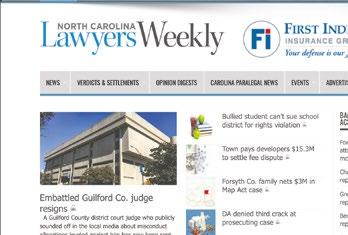




DeVore has a bachelor’s and master’s degree from UNCChapel Hill. He earned his law degree from Wake Forest University School of Law. He is a frequent lecturer for various bar and judicial organizations, focusing on issues ranging from trial tactics to insurance bad faith.
He is president of the executive board of the Mecklenburg County Bar and serves on the Disciplinary Hearing Commission for the State Bar.




NORTH CAROLINA LAWYERS WEEKLY | FEBRUARY 2023 19
W. DEVORE III
PERSONAL INJURY Start your research with North Carolina Lawyers Weekly. Explore our archives of stories and case digests to find that decision you remember. Get copies of the full-text opinions you need. Research verdicts and settlements to compare what your case is worth or to see what experts have been used. It’s all part of your subscription. Explore our online resources today! nclawyersweekly.com/subscribe
FRED
PARTNER, DEVORE, ACTON & STAFFORD CHARLOTTE
CATE E. EDWARDS

Cate Edwards followed her parents’ footsteps into law.
As the daughter of two attorneys (John and Elizabeth), she has fond memories of dinner table conversations filled with interesting discussions about their cases. Her father is also a trial attorney, and she says she was particularly struck by stories he told about helping his clients through life-changing tragedies.
“I listened intently to my father’s stories about preventable tragedies, and how their clients’ lives had changed,” she says. “From an early age, this made me want to spend my whole life standing with these same folks, hearing their stories, and helping them when I can.”
A founding partner of Edwards Beightol in Raleigh, Edwards received a bachelor’s degree in politics and a certificate in political economy from Princeton University, graduating cum laude. She earned her law degree at Harvard Law School and practiced for two years as a student attorney at the Harvard Legal Aid Bureau on behalf of indigent clients throughout the Boston area.
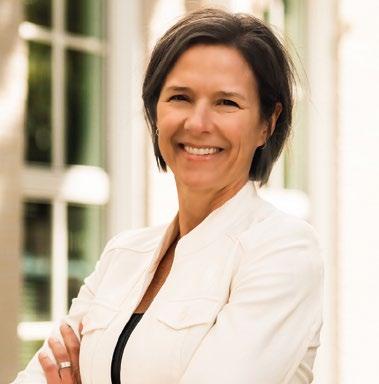

Solving complicated problems and understanding how things work keeps Ann Groninger motivated to represent her clients day after day.

“Whether it’s a liability challenge or figuring how to present a complicated medical issue, I want to know the answer and I will persist until I get it,” she says. “I think that’s why I gravitated toward an area of law with a lot of science.”


In her practice, Groninger combines her passion for advocating for individuals and her love of the bicycling culture.
Groninger is a partner at Johnson & Groninger of Charlotte and is a member of Bike Law, a national network of attorneys who represent cyclists injured in crashes.
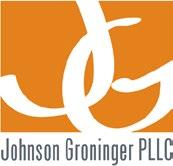



“One of the reasons I love bicycle cases is because they are almost always complicated,” she says. “I also love that my work keeps me connected with the bicycling community and allows me to help fellow bicyclists and their families in their time of need.”
In addition to her law practice, Groninger devotes her time and talent to promoting bicycling, especially women’s bicycling, and authored “Ride Guide” to highlight rules of the road.
20 FEBRUARY 2023 | NORTH CAROLINA LAWYERS WEEKLY
GRONINGER
PERSONAL INJURY Johnson & Groninger Congratulates Ann Groninger for being selected as one of the 20 most influential Personal Injury attorneys in the Carolinas. Durham Office: 300 Blackwell St., Suite # 101 Durham, NC 27701 Charlotte Office: 1018 East Blvd., Suite #6, Charlotte, NC 28203
PARTNER, EDWARDS BEIGHTOL RALEIGH ANN E. GRONINGER PARTNER, JOHNSON &
CHARLOTTE, N.C.
As a brain injury specialist, Thomas Henson has extensive knowledge about the effects of a traumatic brain injury on individuals who suffer them. He also knows of treatment methods and resources available to survivors and their families.
Henson is a partner at Henson Fuerst, a personal injury law firm his father co-founded. The firm has offices in Raleigh and Rocky Mount. Henson joined the firm in 1989 after graduating from UNC-Chapel Hill, where he earned both his bachelor’s degree in business administration and his law degree.

In 2002, Henson formed the Henson Fuerst Cycling Team, which grew into a team of more than 50 cyclists, including top-level triathletes, recreational riders, and novice riders.
In 2012, Governor Bev Perdue appointed Henson to the North Carolina Traumatic Brain Injury Advisory Council, which is responsible for studying the needs of people with brain injuries, coordinating preventive efforts, promoting inter-agency coordination of efforts, and making recommendations about planning, development and funding to the Governor, the General Assembly, and state organizations.
Chris Hinnant was in his second year of law school when he decided litigation was the path for him.
“I clerked for a civil litigation defense firm, and that summer, the firm tried a multi-week personal injury case,” he says. “The lawyers I worked for were really great about giving me a lot of hands-on experience working with witnesses, preparing exhibits, drafting motions/briefs and being in court during the trial.”
He learned to love the courtroom that summer and never thought about doing anything else.
Hinnant joined Barnwell Whaley in 2016 when the firm tapped him to open its Wilmington office.
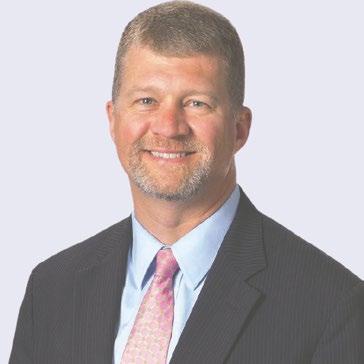

A native of eastern North Carolina, Hinnant has spent two decades handling a broad array of civil litigation from medical malpractice to construction defects, premises liability to dram shop claims, commercial disputes to personal injury.
He also believes a sense of humor is essential.
“The law is a demanding profession,” he says. “If you’re going to stay in it for long, better learn to laugh, especially at yourself, and have some fun along the way.”
NORTH CAROLINA LAWYERS WEEKLY | FEBRUARY 2023 21
THOMAS HENSON, JR. PARTNER, HENSON FUERST RALEIGH CHRISTOPHER M. HINNANT MEMBER, BARNWELL WHALEY ATTORNEYS AT LAW | WILMINGTON BARNWELL WHALEY EST. 1938 720 North 3rd Street, Suite 102 Wilmington, North Carolina 28401 910.679.1388 barnwell-whaley.com Barnwell Whaley congratulates Chris Hinnant in our Wilmington office for being named to North Carolina Lawyers Weekly 2023 Power List! PERSONAL INJURY
DANA H. HOFFMAN
Dana Hoffman found her life’s passion in law school, and when the time came for her to choose a practice area, she decided to play to her strengths, and one of them is empathy.
“Empathy is so important in the personal injury arena – including empathy for the other party and what they’ve gone through,” she says. “I hope that being empathetic throughout the process leads to a more positive experience for everyone.”
Hoffman, a shareholder and litigation team member at Young Moore and Henderson since 1990, she is an adviser and defender of the transportation, long term care and electric industries.
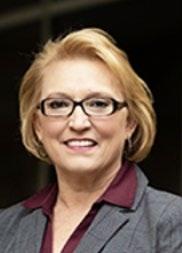
She obtained a Bachelor of Arts degree from UNC-Chapel Hill and earned her law degree from Wake Forest University.
She is active in a variety of professional organizations and is a past president of the Trucking Industry Defense Association (TIDA) where she served a total of 10 years on its board of directors. She is a regular speaker at conferences and is author of numerous articles in newsletters, blogs, magazine articles and scholarly publications.
ALAN JONES
For John Alan Jones, honesty and trust are essential to establishing a successful personal injury practice.

“You can best represent your clients if those on the defense side, including both insurance adjusters and defense attorneys, know you can be trusted,” he says.
Jones, founding member and managing partner at Martin & Jones of Raleigh might have followed an opportunity to practice corporate law and insurance liability defense in Atlanta, but he ultimately chose a different path.
After earning both his bachelor’s degree and law degree from UNC-Chapel Hill, he decided to stay close to home and focus on representing workers with occupational diseases caused by toxic chemicals and cotton dust.
Jones has expanded his practice to include defective pharmaceuticals and harmful medical devices and enjoys helping clients who have suffered life-changing circumstances.
“My greatest reward is the profound, positive impact I have on my clients’ lives and their expressions of gratitude are priceless,” he says.
LAUREN R. MCANDREW
Lisa Lanier found her passion for helping people with all types of injury claims early on.
After graduating from law school, she worked as an associate for a large Triangle law firm for several years, where she practiced insurance defense. In 1995, she opened her own practice in Durham and began her career representing plaintiffs in personal injury cases.
Since then, Lanier Law Group has grown to 10 offices across North Carolina.
Born in High Point, Lanier earned both her undergraduate and law degrees from UNC-Chapel Hill. With a passion for helping veterans and people experiencing homelessness, Lanier and her firm engage in weekly outreach to homeless centers all over the state to help people identify benefits and services they may be entitled to. She also donates and serves meals to large gatherings of people at shelters throughout the state.
Lanier serves on the Regional Advisory Board for BB&T Bank and the is on the Board of Trustees for both Duke School and Art for Hospice.

Lauren McAndrew has spent her entire career as a litigation attorney with Blanchard, Miller, Lewis & Isley, a Raleigh law firm. She focuses her practice on complex civil litigation, having tried cases to verdict in North Carolina Superior Courts.
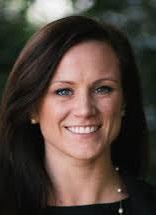
Growing up in Winterville, McAndrew has a Bachelor of Arts degree in Journalism and Mass Communication, public relations and a minor in history, graduating cum laude. She earned her law degree from Campbell University in 2012.
After graduating from law school, McAndrew received the International Academy of Trial Lawyers Student Advocacy Award, the Robert A. Jenkins Award, and was inducted into the Order of the Barristers, a national honorary organization that recognizes graduating law students who have excelled in advocacy.
In addition to her law practice, McAndrew coaches several mock trial teams at Campbell Law School, preparing second and third year law school students to compete in trial competitions across the country.
22 FEBRUARY 2023 | NORTH CAROLINA LAWYERS WEEKLY PERSONAL INJURY
JOHN
FOUNDING MEMBER AND MANAGING PARTNER, MARTIN & JONES | RALEIGH
SHAREHOLDER, YOUNG MOORE LAW RALEIGH
PARTNER, BLANCHARD, MILLER, LEWIS & ISLEY | RALEIGH
LISA LANIER
PRESIDENT AND CEO, LANIER LAW GROUP | DURHAM, N.C.
JOHN M. MCCABE
John McCabe has always known he would be a lawyer. It was a childhood dream he forged when he was a 8 years old, and growing up in Cary, N.C.
Today, he is founder and president of The Law Offices of John M. McCabe, where he focuses on a variety of cases relating to personal injury.
McCabe holds a bachelor’s degree in economics from UNCChapel Hill. He earned his law degree from Campbell University, graduating with honors.
McCabe initially worked for a law firm that defended claims filed by injured people. After seeing the insurance process from the inside, he realized that accident victims need a strong and aggressive advocate. So, in 1995, he began focusing exclusively on representing people across the state who have been injured by trucking collisions, medical negligence, defective products, and on-the-job accidents.
A prolific speaker, McCabe has presented at many continuing education programs for attorneys and has authored numerous articles and guides on “The Rules of the Road” in motor vehicle cases and trucking cases for the N.C. Advocates for Justice.
Jon Moore viewed a career in law as a chance to nurture his passion for learning and an opportunity to constantly evolve within the profession. He also wanted to devote his career to serving others.
“I was inspired by the opportunity to help those whose lives had been profoundly impacted through no fault of their own,” he says.
Moore is a partner at Brown Moore & Associates in Charlotte. Moore is vice president of Legal Affairs for the North Carolina Advocates for Justice He is a member of the American Board of Trial Advocates.

He believes authenticity and remaining true to yourself are keys to success as an attorney.
“Also, a healthy dose of fear that you are never prepared enough,” he says.
Despite the hard work that goes into his practice, Moore enjoys the rewards that come from that labor.
“Being able to help clients through challenging times and knowing that they are satisfied with the results are my top personal rewards,” he says.
Brian M. Ricci has been a dedicated personal injury lawyer in Greenville for the last 25 years. He is founder and owner of the Ricci Law Firm.


Ricci says he became fascinated with personal injury law in his first year of law school after spending a summer working for a personal injury firm. He was struck by the plight of individuals who had been seriously harmed and decided he wanted to devote his career to helping people get their lives back together.
“I saw firsthand the devastating impacts injuries had on people and how it affected their lives,” he says. “This made me realize I wanted to work with real people who were just like my parents who simply needed someone to give them a voice.”
He is the founder of Eastern NC Cares and Triangle NC Cares, an initiative to recognize non-profit organizations that are making a difference in the community. He is also a Multimillion Dollar Advocates Forum life member.

Ricci believes the two most important qualities successful personal injury attorneys need are empathy and competitiveness.
Gene Riddle credits his father with sparking his interest in becoming a personal injury lawyer by encouraging him to pursue a career designed to help people right wrongs.
Riddle is founder and managing partner of Riddle & Brantley, a Goldsboro law firm with 11 offices across the state.
Riddle, a Stanley County native, earned his Bachelor of Arts degree from UNC-Chapel Hill in 1981 and his law degree from Wake Forest University School of in 1985.He has practiced law in North Carolina for more than 30 years.
Focused on personal injury, workers’ compensation, Social Security disability, veterans’ benefits, wrongful death, product liability, and eminent domain, the firm also serves clients in a wide variety of mass tort and class action cases. Riddle is a member of the Multi-Million Dollar Advocates, Riddle believes successful personal injury lawyers must possess “a strong desire to seek justice, and a belief that people who can’t afford a lawyer should have access to justice,” he says.
NORTH CAROLINA LAWYERS WEEKLY | FEBRUARY 2023 23 PERSONAL INJURY
JON R. MOORE
PARTNER, BROWN MOORE & ASSOCIATES CHARLOTTE
GENE A. RIDDLE
FOUNDING AND MANAGING PARTNER, RIDDLE AND BRANTLEY | GOLDSBORO
BRIAN M. RICCI
OWNER, RICCI LAW FIRM GREENVILLE
FOUNDER AND PRESIDENT, THE LAW OFFICES OF JOHN M. MCCABE | CARY
David Sherlin draws inspiration from people who are resilient in the face of adversity.

“Practicing personal injury law is a natural extension of the work I did early in my career as a prosecutor,” he says. “In my practice today, I represent individuals or families who are often faced with a lifetime of hardship or unimaginable loss because of someone’s negligence.”
In 2005, Sherlin began his legal career as an assistant district attorney with the Wake County DA’s office and entered private practice in 2011 and formed Epstein Sherlin in 2021.
Sherlin says he derives his greatest rewards from his ability to make a positive impact on someone’s life. He recalls a time when he helped a family navigate a difficult situation. He did not sign them up as clients, instead he provided them with advice and counsel, and they reconciled their problem.
“As the matter was wrapping up, I met with the family and one of them remarked ‘lawyers are just like real people,’” he recalls. “After the laughter subsided, we agreed to keep in touch, and for several years after that I had dinner with them whenever they were in town.”
JANET WARD BLACK
When asked to name a characteristic that makes her a successful attorney, Janet Ward Black replies simply, “I love what I do.”
Black is the principal owner of Ward Black Law in Greensboro, one of the largest woman-owned law firms in North Carolina. She was just the third female president of the North Carolina Association of Trial Lawyers.
“Professionally, I’ve had the opportunity to handle some interesting cases,” she says. “I’ve represented many individuals hurt by dangerous products, including over 1000 North Carolinians with asbestos diseases such as mesothelioma and lung cancer.“
She is currently representing some North Carolina counties against the manufacturers and distributors of opioids.
In addition to representing clients, Ward Black Law is notable for its policy of giving back, including tithing 10% of the firm’s gross revenue to nonprofits.
“We’ve seen some miraculous things happen and have become friends with many non-profit leaders who are changing our community and our world,” she says.
Ted Smyth says he arrived at personal injury law by chance.
In his second year of law school, he clerked for a firm that practiced both insurance defense and plaintiffs’ work, and he found the cases exciting and intricate. He especially enjoyed many factual, forensic, and legal disputes.
“I was drawn into the large role various aspects of the human condition played in this particular work, and I was able to watch really talented attorneys come at the same cases in very different ways,” he says.
Smyth is of counsel at the Raleigh office of Cranfill Sumner. He has been a litigation attorney since 1981. Smyth believes imagination and planning are essential tools for performing his work as a personal injury lawyer.


“I believe the best time spent in a complex case is sitting in isolation somewhere, focusing on how to get from a case’s current status to its conclusion, and deciding the best route to make that journey,” he says. “Coming up with an over-arching simple theme and trying to define each pertinent party are activities worth their weight in gold.”
Growing up, Ben Whitley watched his father, attorney Bob E. Whitley, help his clients through the hardest times in their lives. That’s when he knew he wanted to devote his career to helping people too.
“Individuals catastrophically injured by others often don’t have the resources to fight large corporations such as insurance companies, and I want to help my clients get results,” he says. “I pride myself in doing this and still maintaining our hometown small firm feel.”
Whitley is a partner in the Raleigh office of Whitley Law Firm, which has offices in 13 cities across North Carolina. He received his bachelor’s degree from UNC-Charlotte and his law from Mississippi College School of Law.
Active in the legal profession, Whitley is a steering committee member of the North Carolina State Bar Lawyers Assistance Program and a past member of the North Carolina Advocates for Justice Board of Governors.
He is known for his dedication to clients and his mantra: “Prepare. Prepare. Prepare.”

24 FEBRUARY 2023 | NORTH CAROLINA LAWYERS WEEKLY PERSONAL INJURY
DAVID SHERLIN
PARTNER, EPSTEIN SHERLIN RALEIGH
ATTORNEY, PRINCIPAL OWNER, WARD BLACK LAW | GREENSBORO
THEODORE B. SMYTH OF COUNSEL, CRANFIL SUMNER RALEIGH
BENJAMIN H. WHITLEY PARTNER, WHITLEY LAW FIRM RALEIGH
How employers can prepare for a possible non-compete ban


Employee non-compete agreements have faced mounting scrutiny in recent years. Proponents say non-competes are indispensable for protecting trade secrets and other business interests. Critics say they hurt employee mobility and wage growth.
Now the federal government has stepped into the fray. On Jan. 5, the Federal Trade Commission proposed a new rule that would ban employee non-competes outright. A nationwide ban could take effect as early as September. Employers that rely on non-compete agreements should get ready now.
Trade secrets and non-competes
A non-compete forbids an employee from working for a competitor in a certain geographic area for a certain period after the employment ends. The idea is to keep the employee from using the employer’s own assets to compete against it.

Most notably, employers use non-compete agreements to protect trade secrets. Trade secrets — engineering plans, software, unreleased products, and customer lists, to take a few examples — can be among a company’s most treasured assets. Unfortunately, trade secrets can also be easy to

steal. For example, a wayward employee may transfer company data to a flash drive in a matter of seconds.



Crucially, non-compete agreements are preventative. By prohibiting an employee from working for a competitor for a limited time, a non-compete can keep an employer’s trade secrets from winding up in a competitor’s hands in the first place.
By contrast, trade secret laws address misappropriation after the fact. These laws provide powerful remedies once a company discov-
See Page 26

NORTH CAROLINA LAWYERS WEEKLY | FEBRUARY 2023 25
COMMENTARY
B y M aXwell G oSS
ers that its secrets were stolen. The problem is that the horse is out of the barn at that point. The damage is done and often cannot be reversed. And in some cases, the company is unable to prove in court who stole its information — but its business is damaged all the same.
Businesses also use non-competes to protect customer relationships, investment in training, and company goodwill. Employers across a range of industries regard non-compete agreements as a vital tool for protecting innovation and investment.
Non-competes in the crosshairs
The law treats non-compete agreements as “restraints of trade.” That is, they are restrictions on free market competition that demand close scrutiny. Nevertheless, with a few exceptions — California being the most notable — most U.S. jurisdictions have decided that non-competes are acceptable under certain conditions.
Reasonableness is key. While requirements vary, states that allow non-compete agreements generally require them to be reasonable in scope and to protect a legitimate business interest. However, abuse is rampant. Too often, companies use overreaching non-competes to harass departing employees and squelch competition.
A famous example is Jimmy John’s. A few years ago, the attorneys general of Illinois and New York challenged the sandwich chain for allegedly imposing an unreasonable non-compete on all employees, even sandwich makers. For these and other hourly workers, there seemed to be no trade secrets or other genuine business interests at stake. Jimmy Johns
reached a settlement with both states in 2016.
Since that time, critics have grown louder and many states have tightened or overhauled their non-compete laws. In the past two years alone, around a dozen states have enacted new statutes, and several more have bills currently pending.
Non-competes are now in the federal government’s crosshairs. In 2021, President Biden issued an executive order calling on the Federal Trade Commission to rein in non-compete agreements. While some doubted the FTC would seek to impose a total ban, it is now doing exactly that. This January, the agency proposed an administrative rule that would prohibit all employee non-compete agreements, with only negligible exceptions. This sweeping rule would also nullify all existing employee non-competes and require employers to tell this to their employees.
The FTC is taking public comment until early March. After that, it will publish a final version of the rule. Enforcement of the rule begins 180 days later.
What businesses should do to get ready
In could be months or years before the ultimate outcome of the FTC’s proposed rule is known. It faces fierce opposition, and it may or may not be published in its present form. Once the rule is published, legal challenges are likely to follow. Courts could potentially strike down the rule or limit its reach. But that is far from certain.
In the meantime, employers must make sure that their trade secrets and other legitimate interests are protected. Here are five actions
employers should consider:
Review standard non-compete agreements and update them as needed to conform to current state law and best practices. Notably, the FTC has already begun taking legal action against employers it alleges are using non-competes unfairly. It has done so even without the proposed rule in place.
Review and revise non-solicitation agreements as appropriate. The FTC has excluded customer non-solicits from its proposed rule. But non-solicits must be carefully drafted to avoid being construed as de facto non-competes.
Review nondisclosure and confidentiality agreements with employees and revise them as appropriate. The FTC has warned that an overly broad NDA may constitute a de facto non-compete and run afoul of the rule.
Step up other protective measures. For trade secrets, employers might enhance their security measures, for example. Keep squarely in mind that existing non-compete agreements could be nullified or severely curtailed.
Stay informed of new legal developments and adjust as needed. Even before the FTC stepped in, non-compete law required close monitoring due to the constant changes in law and variation among states. With the proposed rule and challenges on the horizon, timely information is more important than ever.
One thing seems certain: Disruption is coming. Employers that act proactively and stay informed will be in the best position to handle whatever changes may come.
Maxwell Goss is a litigation partner with Fishman Stewart. He handles trade secret and intellectual property matters in Michigan and around the country.

26 FEBRUARY 2023 | NORTH CAROLINA LAWYERS WEEKLY
Continued From Page 25 COMMENTARY
Maxwell Goss
$$7.5 MILLION SETTLEMENT 13-year-old shooting victim settles for $7.5M
Type of Action: Inadequate security and personal injury
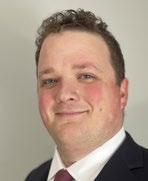
Injuries Alleged: 13-year-old plaintiff suffered paraplegia with loss of bowel and bladder function
Name of Case: Withheld
Court: Withheld
Case #: Withheld
Verdict or Settlement: Settlement
Amount: $7.5 million
Date of Settlement: September 2022
Attorneys for Plaintiffs: John Jensen, Jensen Law Group (Chapel Hill) and Michele Cybulski, Guardian Ad Litem, Deuterman Law Group (Greensboro)
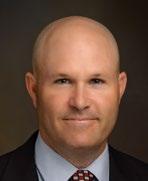
Attorneys for Defendant: Withheld
Were liability and/or damages contested: Yes
Was opposing party represented by legal counsel: Yes
Has the plaintiff been successful in collecting the judgment: Yes
By Haviland Stewart hstewart@nclawyersweekly.com
A teenager who was struck with a stray bullet and paralyzed has reached a $7.5 million settlement.
The plaintiff – who was 13 at the time – was visiting friends, when she was shot in their apartment complex parking lot. According to the plaintiff’s counsel, John Jensen, a stray bullet from a gang-related shooting severed her spinal cord, resulting in paraplegia.
According to Jensen, this was not the first record of violent crimes causing harm to innocent residents and visitors on apartment complex property.
The plaintiff brought claims against the apartment complex owners and property managers for inadequate security. Although defendants disputed liability for the plaintiff’s injuries caused by criminal acts of third persons, North Carolina law holds that if circumstances give the landowner reason to know
that third persons were likely to endanger visitors to the property, a duty may exist to protect or warn the visitor, Jensen reported. The plaintiff’s counsel argued that the shooting was foreseeable based on prior criminal activity at the apartment complex and in the surrounding neighborhoods.
Jensen reported that there were nearly 10,000 calls for service reporting violent criminal activity and/or requesting police assistance from a half-mile radius surrounding the apartment complex during the four years prior to the plaintiff’s injury. Additionally, during the three years leading up to the events at issue, there had been numerous shootings that occurred in the apartment complex common areas that were tragically similar to this incident.
The plaintiff’s counsel reported, despite numerous violent crimes occurring on the property, the apartment owners and management took no steps to try to keep the complex safer for its residents or their visitors. According to Jensen, it was common for other apartment complexes in the area to have video cameras, security gates, perimeter fencing, a neighborhood watch program, security guards, and adequate lighting in the parking lots and around the buildings.
At the defendant apartment complex, these precautions were lacking, despite police officers considering the apartment property to be high crime area.
“Despite the fact that this was a gang related shooting, we felt very strongly that the apartment complex could have done more to protect the residents and their visitors,” Jensen said. “This was not a case where the apartment complex made efforts to keep the property safe and fell short. This was a case where the property management – despite the violent crime occurring in its common areas –chose to do nothing. Because of this cavalier attitude toward safety, our client’s life has been forever changed.”
In September 2022, the plaintiff settled for $7.5 million. ◆
$$3.03 MILLION SETTLEMENT Plaintiff hit by driver in construction zone settles for $3.03 M

Is this a verdict or settlement? Settlement
Type of Action: Automobile Accident in a Construction Zone
Amount: $3.03 million
• $3,000,000 – Construction Company
• $30,000 – Pickup Truck Driver
Injuries alleged: Brain injury
Case name: Withheld
Court: Withheld
Date of verdict or settlement: July 2022
Attorney for plaintiff: John Chilson and Zac Harris, of Comerford, Chilson & Moser, LLP, and Ben and Brian Royster, of Royster and Royster, PLLC
Attorneys for defendants: Withheld
Was the defendant represented by counsel? Yes
Were liability and damages contested? Yes
Was the judgment successfully collected? Yes
By Haviland Stewart hstewart@nclawyersweekly com
A 71-year-old pedestrian who was struck by a pickup truck has reached a $3.03 million seettlement. The plaintiff was struck by a pickup truck while crossing the street of a small-town intersection that was undergoing construction. The plaintiff, however, did not file suit against the pickup truck driver who hit her, but rather the construction company responsible for controlling traffic at the intersection.
At the time of the accident, a road construction crew was resurfacing the southbound lane just south of the intersection. According
NORTH CAROLINA LAWYERS WEEKLY | FEBRUARY 2023 27 VERDICTS & SETTLEMENTS
John Jensen
John Chilson
Zac Harris
to plaintiff counsel John Chilson, southbound traffic was diverted to the middle turn lane while the southbound lane was closed. The northbound lane remained open for northbound traffic. After the plaintiff walked through the southbound and middle lanes, and just before she emerged on the other eastern side of the street, she was struck by a pickup truck that was traveling south in the northbound lane in the construction zone. The collision, which caused the plaintiff to violently strike her head on the roadway, was captured on nearby security videos.
According to Chilson, due to the accident, the plaintiff sustained many permanent injuries, including a traumatic brain bleed that has rendered her entirely dependent on her daughter and confined to an assisted living facility.
Rather than filing suit against the pickup truck driver, the plaintiff alleged that the construction company was at fault for the accident due to failure to properly manage traffic. The plaintiff’s counsel argued that the construction zone was confusing for both pedestrians and traffic, nor was it designed or controlled in accordance with applicable transportation regulations.
The defendant alleged contributory negligence by the plaintiff and asserted a third-party claim against the pickup truck driver. The case was mediated unsuccessfully before the case was filed, but the parties settled shortly before trial for a total of $3.03 million. ◆
$$6.2M MILLION SETTLEMENT Accident causing brain injury leads to $6.2M settlement
Is this a verdict or a settlement? Settlement
Type of case: Motor Vehicle wreck
Amount: $6.2 million
Injuries alleged: Traumatic Brain Injury and cognitive decline
Case name: Withheld
Court: Withheld
Case No.: Withheld
Judge: Withheld
Date of settlement: 2022
Attorney(s) for plaintiff and their firm(s): James Rainford, Jason Murphy, and Billy Massengale

Attorney(s) for defendant and their firm(s): Withheld
Was the opposing represented by counsel? Yes
Were liability and/or damages contested? Liability was contested
Has the judgment been successfully collected? Yes
By Haviland Stewart hstewart@nclawyersweekly com
Injuries caused by a vehicle accident have resulted in a $6.2 million settlement.
In 2018 the plaintiff suffered a traumatic brain injury after being struck by another motorist. The plaintiff was hospitalized for several weeks and had to undergo extensive rehabilitative care, with medical expenses totaling at $178,000.
“Our client has long term issues with short term memory and some cognitive decline although miraculously our client has made significant improvement to the point that our client now lives independently and has a
daily schedule of meaningful activities,” plaintiff attorney James Rainsford said.
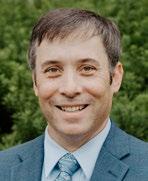



The plaintiff has been out of work since the accident but hopes to return to some employment in the future.
Loss of future earnings and future medical expenses was included in the settlement, which totaled $6.2 million.
Many details of the case have been withheld die to a confidentiality agreement. ◆
$$545K SETTLEMENT
Motorcyclist hit by drunk driver settles for $545K
Type of action: SUV v. Motorcycle Collision – Drunk Driver Verdict or settlement: Settlement
Amount: $544,872.50 ($505,000 – bodily injury and $39,872.50 property damage)
Injuries: Left Hip Fracture (Comminuted Intertrochanteric fracture), subsequent trochanteric bursitis and the femoral shaft fracture. The hip fracture required surgery (Intramedullary nail fixation).
Permanent Partial Disability Ratings: 10% whole person / 25% left leg.
Name of case: Withheld
Venue: Buncombe County
Case #: Pre-suit
Date of settlement: January 2023
Insurance carriers: Nationwide – Liability ; GEICO – Primary UIM (Delaware policy – No Offset for Liability Coverage; USAA – Excess UIM (Delaware policy – No Offset for Liability Coverage
Attorney for plaintiff: C. Douglas Maynard Jr. of Law Offices of C. Douglas Maynard Jr., PLLC and Larry Kimmel of Kimmel Carter
Was the defendant represented by council: No
By Haviland Stewart hstewart@nclawyersweekly.com
A motorcyclist hit by a drunk driver has reached a $545,000 settlement. A 72-year-old plaintiff was riding his motorcycle on the Blue Ridge Parkway, when he was struck by a drunk driver. According to the plain-
28 FEBRUARY 2023 | NORTH CAROLINA LAWYERS WEEKLY
VERDICTS & SETTLEMENTS
James Rainsford
Billy Massengale
Jason Murphy
Ben Royster
Brian Royster
tiff’s council, Douglas Maynard, the plaintiff turned left on a green light, when the defendant, driving an SUV, ran a red light and slammed into left side of the plaintiff’s body and motorcycle.
The defendant blood alcohol level was determined to be significantly over the legal limit, with a BAC of 0.33. According to Maynard, an hour prior to the accident with the plaintiff, the defendant had driven into the side of a hotel and fled the scene.
The plaintiff suffered significant injuries upon impact, including a comminuted intertrochanteric fracture to his left hip, trochanteric bursitis, and a femoral shaft fracture. He was transported to the hospital where he underwent internal fixation surgery on his hip the following day. The plaintiff was hospitalized for four days before moving to a rehabilitation facility, Maynard reported.
While in recovery, the plaintiff fell descending the staircase at his residence, which required additional hospitalization and rehabilitation. After the fall, his doctor found a new fracture on the mid-shaft of the femur with stable fixation from previous internal fixation, Maynard reported. The plaintiff’s doctor determined this additional fracture to be directly related to the accident.
According to Maynard, the plaintiff’s permanent injuries have had a significantly impact on his lifestyle, that previously included motorcycle riding and golf.
The plaintiff was awarded approximately $545,000 in January 2023. ◆
$$450K SETTLEMENT Party bus passenger settles for $450K
Is this a verdict or a settlement? Settlement
Type of case: Motor vehicle accident
Amount: $450,000
Injuries alleged: Broken tibia/fibula (rod inserted during surgery), fractured clavicle, fractured scapular, fractured mandible, fractured pelvis, torn ACL
Case name: Tripp v. Williams
Court: Durham County
Case No.: 19 CVS 4027
Date: Jan. 3, 2023
Insurance carrier: Allstate
Attorney(s) for plaintiff and their firm(s): Mark Gray II, Gray Legal Group

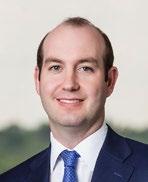
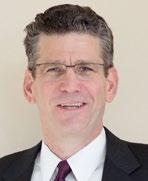
Defense Attorney: Walter Burton, WK Burton Law Was the opposing represented by counsel? Yes Attorney(s) for defendant and their firm(s): Walter Burton, WK Burton Law
Were liability and/or damages contested? Yes
By Haviland Stewart hstewart@nclawyersweekly com
In October 2016, the plaintiff was a guest on a Raleigh based party bus, celebrating a friend’s birthday traveling from Raleigh to Durham, and back.
According to the plaintiff’s attorney Mark Gray II, on the group’s drive back to Raleigh, the bus driver requested the plaintiff to get off the bus for unexplained reasons.
The plaintiff exited the bus on an unlit portion of Highway 147 and was then struck by a vehicle traveling at highway speeds.
“As a result of the accident, the plaintiff sustained several fractures including fractures to his tibia, fibula, mandible, scapular, clavicle, transverse pubic and teeth,” Gray said.
“The plaintiff also sustained a torn ACL and meniscus. After months of rehab, the plaintiff learned how to
walk again and has had an excellent recovery.”
Following the accident, the party bus company denied liability for the plaintiff’s injuries. Their insurance company also stated that they would not provide coverage for the incident, because the accident did not occur on the bus, Gray reported.
In September 2021, Gray got a summary judgment motion granted on the issue of negligence on the bus and a dismissal of contributory negligence for the defendant.
Defense attorney Walter Burton sought to have the summary judgment overturned but was unsuccessful and the court upheld the finding of liability for the bus.
“Some of the issues of liability could not be contested,” Burton said. “Because the court had already ruled on that, without the carrier being able to contest.”
Upon learning the liability was established against the party bus company, the defendants sought a mediation to settle the case.
Settlement was reached in January 2023 for a total of $450,000.◆
$$15M SETTLEMENT
Families of passengers killed in a plane crash settle for $15M
Is this a verdict or a settlement? Settlement
Type of case: Wrongful death - plane crash
Amount: $15,000,000.00
Injuries alleged: Death
Case name: Estate of Stephanie Fulcher, Estate of Noah Styron, Estate of Jacob Taylor, Estate of Michael Shepherd, Estate of Kole McInnis v. EDP Management Group, LLC et al.
Court: Carteret County Superior Court
Case No.: 22 CVS 443, 22 CVS 444, 22 CVS 445, 22 CVS 446 & 22 CVS 698
Date of verdict or settlement: Nov. 30, 2022
Attorney(s) for plaintiff and their firm(s): Will Owen of Musselwhite, Musselwhite, Branch & Grantham (Lumberton, N.C.), Gary Robb (Robb & Robb, Kansas City, Mo., Admitted Pro Hac Vice), Andrew Robb (Robb & Robb, Kansas City, Mo.,
NORTH CAROLINA LAWYERS WEEKLY | FEBRUARY 2023 29 VERDICTS & SETTLEMENTS
Doug Maynard
Larry Kimmel
Mark Grey II
Admitted Pro Hac Vice)
Attorney(s) for defendant and their firm(s): James S. Strawinski and Nicole Wolfe Stout of Strawinski & Scout, John P. Marshall of White & Allen, P.A., and Susan Hofer of Cranfil Sumner LLP.
Was the opposing represented by counsel? Yes
Were liability and/or damages contested? Yes
Has the judgment been successfully collected? Yes
By Haviland Stewart hstewart@nclawyersweekly.com
On Feb. 13, 2022, a Pilatus PC-12 crashed into the Atlantic Ocean near Beaufort, N.C., killing all eight onboard. North Carolina attorney Will Owen, along with Gary and Andrew Robb of MO, represented five of the families affected by the tragedy.
The passengers had been duck hunting in Hyde County prior to the crash and were traveling back to Beauford, Owen reported. The plaintiff council represented the estates of passengers, Stephanie Fulcher, Noah Styron, Jacob Taylor, Michael Shepherd and Kole McInnis.
After an investigation, the plaintiff’s council determined the probable cause of the crash to be the pilot’s unrecognized spatial disorientation, failure to use flight instruments in Instrument Meteorological Conditions (IMC) weather conditions, and disregard for clear and direct instructions from Air Traffic Control.
According to Owen, spatial disorientation almost always occurs when a pilot encounters cloudy and/or foggy weather conditions while flying under Visual Flight Rules (VFR).
The flight path and the cloud patterns demonstrate that the pilot was attempting to “hole hunt” – pierce through cloud patterns and back into VFR conditions – when the crash occurred. “Hole hunting” is a piloting decision that occurs after a pilot loses visual connection with the horizon line and seeks to regain visual horizon-line connection by hand-flying the aircraft into VFR conditions. According to Owen, “hole hunting” is extremely dangerous and a clear violation of the standard of care.
The flight path and radar data indicate that towards the end of the flight, the pilot failed to engage autopilot. Failure to properly use the flight instruments is another condition of unrecognized spatial disorientation, Owen reported.
On November 30, 2022, the plaintiff’s settled for a total of $15 million.
“Through this, my clients were hoping that we can prevent this from happening to other experienced pilots in the future,” Owen said. “Maybe additional or reinforcement of training on what to do when you encounter Instrument Flight Rules conditions, and when you need to rely on your instruments and your autopilot.” ◆
$$250K SETTLEMENT
Rear-ended driver settles for $250K
Is this a verdict or a settlement? Settlement
Type of case: Motor Vehicle accident
Amount: $250,000
Injuries alleged: Spinal injuries (aggravation of pre-existing spinal stenosis condition)
Case name: Williams v. Laws
Court: Alamance County
Case No.: 21 CVS 1309
VERDICTS & SETTLEMENTS
Date of settlement: Dec. 20, 2022
Most helpful experts: Dr. Vinay Reddy, UNC Health
Attorney(s) for plaintiff and their firm(s): Mark Gray, II , Gray Legal Group

Was the opposing represented by counsel? Yes
Attorney(s) for defendant and their firm(s): James D. McAlister, McAngus, Goudelock, & Courie
Were liability and/or damages contested? Yes
Has the judgment been successfully collected? Yes
Has the judgment been successfully collected? Yes
By Haviland Stewart hstewart@nclawyersweekly.com
In June 2018, a plaintiff’s vehicle was stopped at a stop sign when he was rear ended by the defendant. Over four years later, the plaintiff settled for $250,000.
According to plaintiff’s attorney, Mark Gray II, several issues arose during the plaintiff’s case regarding damages: that the property damage impact of the accident was only listed as $250 on the accident report, and that the plaintiff had pre-existing injuries and was recommended to have surgery for the exact same injuries caused by the accident years prior.


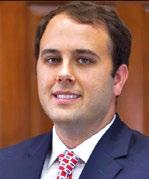
Following the accident, the plaintiff was considered disabled by the Social Security Administration and was unable to continue working as a truck driver, which resulted in loss of income.
“When I got a copy of his SSA report, I changed the focus of our case,” Gray said. “Instead of arguing the medical damages which were clearly muddled by his pre-existing condition. I simply argued about his inability to work. By narrowing down our focus we were able to get a meaningful settlement. Prior to the final mediation the highest offer was $70,000.”
The defense attorney did not respond for comment. ◆
30 FEBRUARY 2023 | NORTH CAROLINA LAWYERS WEEKLY
Will Owen
Gary Robb
Andrew Robb
Mark Grey II
Lawsuit results in clarification of NC law
By Haviland Stewart hstewart@nclawyersweekly.com
A verdict that was appealed and overturned twice before ultimately being reinstated by the North Carolina Supreme Court has resulted in the clarification of case law regarding negligent hiring, supervision or retention.

From 2012 to 2016, Thomas and Teresa Keith, an an elderly couple, hired a home health care agency, Health-Pro Home Care Services Inc. to help them manage their declining health.
In 2015, Health-Pro assigned a new aide, Deitra Clark, to the Keiths.
Shortly after, the Keiths began noticing money missing from their house. In August 2016, after reporting this, Health-Pro determined that Clark, as well as one other aide, were suspects.
The Keiths would eventually file a lawsuit against Health-Pro.
According to the Keith’s counsel, Jeremy Wilson (Christopher Edwards and Alex Dale served as co-counsel), Clark was dishonest about her background and Health-Pro failed to perform proper inspection before hiring her. On her Health-Pro application, Clark certified that she had never been convicted of, or pled guilty, to a crime.
At trial the Keith’s son testified to telling Health-Pro not to send Clark back into the home, and that HealthPro agreed not to. It also agreed to continue to “investigate everything” regarding the missing money.
According to Wilson, Health-Pro took no further action in investigating this, and two weeks later placed Clark back in the Keith’s home. The Keiths assumed that if Clark was back to their home, Health-Pro must have completed its investigation and determined she was not a threat.
At trial, Health-Pro disputed many
of these allegations and contested numerous issues of fact.
Shortly after Clark was placed back in the home, she used the knowledge that she had gained while working with the Keiths to orchestrate a home invasion and armed robbery in September 2016.
Clark eventually pleaded guilty to first-degree burglary and second-degree kidnapping.
According to Wilson, after that night, life became very different for the Keiths. The feeling of safety and security in their home was gone, and they were both diagnosed with PTSD.
The Keith’s filed a lawsuit against Health-Pro in December 2016, alleging that Health-Pro had been negligent in assigning Clark to their home, in failing to identify the warning signs associated with her conduct, in placing her back in the home despite stating that they would not do so, and in failing to conduct proper investigation of the initial theft.
The Keiths presented their case as one for “ordinary negligence” and did not make a specific claim for “negligent hiring, supervision, or retention.” A jury trial was held in April 2018, and the jury awarded a $750,000 verdict to the Keith’s.
Health-Pro appealed, arguing, in part, that North Carolina law did not
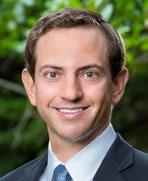

allow a company to be held responsible for intentional acts of its employees, particularly when this type of conduct occurs “off the clock.”
Arguing that the home invasion and robbery were not foreseeable harms, and that the Keith’s claim should be negligent hiring, supervision, or retention rather than ordinary negligence.
The Court of Appeals agreed and overturned the jury’s verdict largely based on the interpretation of Little v. Omega Meats Supreme Court Opinion.
The Keith’s appealed to the North Carolina Supreme Court. The Supreme Court overturned the Court of Appeals and reinstated the jury’s verdict. The Supreme Court concluded that the Keiths had presented a claim for negligent hiring, supervision, or retention, and, while these claims do have additional requirements under North Carolina law, the Keith’s presented sufficient evidence to reach the jury.
The Supreme Court found that the Court of Appeals had erred in applying an overly restrictive interpretation of Little v. Omega Meats. The Supreme Court concluded that the jury verdict should be reinstated. In its opinion, the Supreme Court clarified case law concerning what evidence must exist to establish a valid claim for negligent hiring, supervision, or retention. With interest, the Keith’s jury verdict totaled at over $1 million.
The Supreme court clarified case law and the required standard, including that an employer may owe a duty of care to a victim of an employee’s intentional conduct, “when there is a nexus between the employment relationship and the injury.”
While the Supreme Court opinion doesn’t expand on employer liability, it clarifies this area of the law, which is vital for the legal community, employers, and members of the public.
NORTH CAROLINA LAWYERS WEEKLY | FEBRUARY 2023 31 VERDICTS & SETTLEMENTS: EXTRA
Alex Dale
Christopher Edwards Jeremy Wilson
Smith Anderson elects three to partnership
Smith Anderson, the largest business and litigation law firm headquartered in the Research Triangle region of North Carolina, has elected attorneys Jordan Fieldstein, Casey Vaughn and Philip Romohr as partners in the firm.
Fieldstein focuses her practice on transactional tax, private equity and corporate transactional work. She is a key member of the firm’s deal teams.

Vaughn is a member of the firm’s Construction and Litigation groups, representing contractors, owners, developers and others in a wide range of disputes and construction related matters.
Romohr works with the firm’s Banking and Finance team, with a focus on venture finance, representing banks and other financial institutions on banking and regulatory matters, loans and finance transactions and general commercial/ corporate issues.
Former Duke Energy executive joins firm
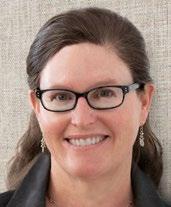
Brian Franklin, who spent 15 years at Duke Energy, most recently as managing director of regulatory affairs for North Carolina, has joined McGuireWoods as a partner in Charlotte, NC.

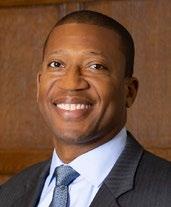
At Duke, Franklin led a team handling all regulatory matters for its subsidiaries
Duke Energy
Carolinas and Duke Energy Progress.
Franklin previously served as Duke Energy’s associate general counsel, representing the company before public utility commissions in both North and South Carolina.
Firm names office managing partner
Womble Bond Dickinson announced that John Morrow has been named office
managing partner of the firm’s WinstonSalem and Greensboro offices. He succeeds Kim Mann, who has led the Winston-Salem office for the past five years and the Greensboro office since last year.
Morrow’s practice focuses primarily on infringement disputes involving patents, trademarks/trade dress, and copyrights, as well as unfair competition, trade secret misappropriation, false advertising, and cybersecurity. He served as chair of Womble Bond Dickinson’s Intellectual Property Litigation practice group from 2012 to 2021.

Shumaker adds partner at Charlotte location
Shumaker announced today that four lawyers have been elected to firm partnership, including at its Charlotte office.
Tom BenGera joins the firm’s Charlotte office. An intellectual property lawyer, BenGera focuses specifically on trademark, patent, and copyright law. He represents and counsels technology clients in IP matters, including pre-suit diligence, fact and expert discovery, motion practice, depositions, and at trial.

BenGera has counseled clients on the offensive and defensive side of patent, antitrust, and trademark disputes, and has represented some of the world’s premier multinational corporations. His practice covers a wide range of technology.
Attorney rejoins Robinson Bradshaw as shareholder
Robinson Bradshaw has welcomed back Jeffrey Hart as a shareholder at the firm in
Chapel Hill. Hart first joined Robinson Bradshaw in 1997 and opened the firm’s Research Triangle office in 2008.
His primary areas of practice include private equity financings and investments, joint ventures and private fund formation. He earned his law degree from Duke University and graduated cum laude with honors from Davidson College, where he was Phi Beta Kappa and a Ken Kelley Scholar.
Hart will work in Robinson Bradshaw’s Research Triangle office.
International firm names new partner
International law firm Bryan Cave Leighton Paisner announced the addition of Partner Jennifer Csik Hutchens to the Corporate & Finance Transactions Department as the firm’s new Global Head of Health Care.
Csik Hutchens will lead the firm’s cross-sectional practice across the health care industry vertical, which comprehensively spans transactions, risk management and litigation. She will be resident in BCLP’s Charlotte office.
She joins BCLP from Robinson Bradshaw, where she co-chaired that firm’s Health Care Practice Group.
Ragsdale Liggett adds partner
Ragsdale Liggett announced Skye MacLeod has been named partner. MacLeod has more than 25 years’ experience handling complex legal issues. Her practice
32 FEBRUARY 2023 | NORTH CAROLINA LAWYERS WEEKLY
LAWYERS IN THE NEWS
is focused in the areas of environmental, estates and trusts, business, real property, construction, and insurance litigation with extensive experience in the areas of product liability, fire and water losses and personal injury.



MacLeod has a master’s of studies degree in Environmental Law from Vermont Law School, and earned her JD from Cumberland School of Law and her bachelor’s from Davidson College.
Ward and Smith welcomes new attorney
Ward and Smith announced that veteran litigation attorney Ellis Boyle has joined the firm’s Raleigh office.
Ellis has nearly 20 years of experience handling complex legal disputes in courtrooms across North Carolina. He joins a deep bench at Ward and Smith.
Ellis’s practice encompasses a range of areas, including business disputes, personal injury and wrongful death claims, and
other general litigation matters.
Womble Bond Dickinson promotes eight NC attorneys
Womble Bond Dickinson LLP has pro-moted 16 new partners and of counsel — eightofwhomarebasedinthe firm’sNorthCarolinaoffices.

Theyinclude:
Dave Easwaran (partner, Charlotte,) concentrates his practice on software patent matters. He is experienced in all aspects of patent practice, including pat-entportfolio development,post-grantpro-ceedings, pre-litigation interactions, and litigation.
Sam Hartzell (partner, Raleigh,) is a busi-ness litigation attorney who joined thefirmin2015.HecametoWBDfollowing a federal clerkship with the U.S. Court of AppealsfortheFourthCircuit.
Chris Hewitt (of counsel, WinstonSalem,) is a corporate and private wealth lawyer, focusing his practice in the areas of com-
plex estate planning, generational wealth transfer planning, trust and estate administration and tax-exempt planning.
Travis Iams (partner, Charlotte) is an intellectual property attorney focused on mechanical patent prosecution.
Kimberly Richards (partner, WinstonSalem) guides clients in corporate and commercial real estate transactions, including financings, acquisitions, dispositions, and real estate development projects.
Gemma Saluta (partner, Winston-Salem) defends large insurance carriers in first-party bad faith litigation.
Jesse Schaefer (partner, Raleigh) regularly represents clients in high-stakes litigation involving contracts, business and regulatory disputes, judgment enforcement and defense, contested will and trust matters, and life insurance and disability insurance disputes.
Al Windham (partner, Raleigh) helps manufacturers in the retail and consumer goods industry navigate complex products liability and mass torts litigation.

NORTH CAROLINA LAWYERS WEEKLY | FEBRUARY 2023 33 LAWYER TO LAWYER / Directory John P. Marshall COMMERCIAL & CONSTRUCTION LITIGATION 106 S. McLewean Street P.O. Box 3169 Kinston, NC 28502-3169 252.527.8000 x245 Fax: 252.527.8128 jmarshall@whiteandallen.com
NEWS
LAWYERS IN THE
Your business partner. Serving Eastern NC 252.633.1930 www.olivercheek.com •All Chapters of Bankruptcy • Alternatives to Bankruptcies • Receiverships Tough Times Require Trusted Lawyers • All Chapters of Bankruptcy • Alternatives to Bankruptcies • Receiverships
North Carolina goes to Washington
Two of the blockbuster cases at the Supreme Court of the United States this term hail from North Carolina. Here’s a look at the two cases, now that oral arguments are in the rearview mirror.
The Affirmative Action Cases
No need to bury the lede: Affirmative action died when the Court granted certiorari.
District Judge Loretta Biggs, of our Middle District, concluded that UNC’s affirmative action program is lawful. Now at the Supreme Court, the central question is whether the Court should overturn Grutter v. Bollinger, a 2003 case that permitted universities to consider an applicant’s race as part of a “holistic review.” Being considered with the UNC case is a parallel case against Harvard. The back-to-back oral arguments spanned five hours.
At oral argument, Grutter got little love. The six conservative justices were skeptical of the precedent and the universities’ arguments. That skepticism reflects public sentiment. According to a recent Pew poll, nearly three-quarters of Americans oppose affirmative action.
A problem for UNC dominated the argument. If diversity is UNC’s goal, how will it know when its mission is accomplished? Arguing for UNC, North Carolina Solicitor General Ryan Park couldn’t satisfy the justices. And the problem isn’t Park’s advocacy skills—Ryan’s one of the finest appellate advocates in our state. The problem is that there was no good answer. UNC would continue using affirmative action even if its demographics matched those of the state.
But not everything was rosy for the challengers. There was much talk about race-neutral alternatives. Nine states have banned affirmative action, and they say they’ve achieved diversity without racial discrimination in college admissions.
That puts everyone in an awkward position. If that many states can achieve diversity without considering race, then UNC and Harvard can, too. Then again, if the race-neutral alternatives just achieve the same result, why all the fuss about affirmative action?
Here’s my prediction. The Court will overrule Grutter and ban racial preferences. Expect the next phase of this fight to be over race-neutral alternatives, as universities seek new ways to protect the old ways. Affirmative action is dead; long live affirmative action?
The Independent State Legislature Doctrine
The other case, Moore v. Harper, is a different animal because half the battle is understanding what’s at stake.
Under the election clause of the federal constitution, the rules governing federal elections must “be prescribed in each State by the Legislature thereof.” Besides Congress, which can check the state legislatures, who or what else can restrain the legislatures when they pass laws for federal elections?
The issue has some urgency, if we’re to avoid the Supreme Court deciding another presidential election, like Bush v. Gore. This issue has come up in the some of the last election cycles, as challengers argued that state supreme courts were rewriting the election rules, in violation of the election clause.
Moore v. Harper arises from a 2022 opinion from the Supreme Court of North Carolina. In that case, our state Supreme Court held that our state constitution bans partisan gerrymandering.
The legislators then took their case to the U.S. Supreme Court, arguing that the N.C. Supreme Court’s decision violates the federal election clause. At oral argument, the legislators presented a broad argument and a narrower one.
The broad argument is that state constitutions cannot limit the power of state legislatures to set the rules for federal elections. The state legislatures are independent of state constitutional restrictions when they perform this federal function.
Represented by the D.C. firm Cooper & Kirk, the legislators put most of their eggs in this basket. But this was a miscalculation. I couldn’t see five votes for the broad argument.
The reception was warmer for the narrower argument: that the N.C. Supreme Court was legislating when it “discovered” a prohibition on partisan gerrymandering in the state constitution. If a state constitutional provision doesn’t provide judicially discoverable and manageable standards, it can’t be used to restrict a state legislature’s federal duty to draw federal districts. That’s the same reason the U.S. Supreme Court rejected partisan gerrymandering claims under the federal constitution in 2019.
Still, it’s hard to count to five even for this narrower theory.
Then again, if the Court waits, it may never need to answer the question. On February 3, 2023, the N.C. Supreme Court agreed to reconsider its prior opinion recognizing partisan gerrymandering claims. If our Court sides with the legislators, that may moot the appeal up in D.C.
Expect opinions in both cases by June.
Troy Shelton is an appellate partner in Raleigh at Fox Rothschild LLP. He partners with trial attorneys to win on appeal in state and federal courts.

34 FEBRUARY 2023 | NORTH CAROLINA LAWYERS WEEKLY COMMENTARY
Troy Shelton
At Liberty University School of Law, we provide unparalleled skills training to produce practice-ready graduates who will become lawyers of distinction. We promote a culture that cultivates both integrity and high ethical standards to ensure our graduates are ready to lead in their communities.
At Liberty University School of Law, we provide unparalleled skills training to produce practice-ready graduates who will become lawyers of distinction. We promote a culture that cultivates both integrity and high ethical standards to ensure our graduates are ready to lead in their communities.
At Liberty University School of Law, we provide unparalleled skills training to produce practice-ready graduates who will become lawyers of distinction. We promote a culture that cultivates both integrity and high ethical standards to ensure our graduates are ready to lead in their communities.
At Liberty University School of Law, we provide unparalleled skills training to produce practice-ready graduates who will become lawyers of distinction. We promote a culture that cultivates both integrity and high ethical standards to ensure our graduates are ready to lead in their communities.
At Liberty University School of Law, we provide unparalleled skills training to produce practice-ready graduates who will become lawyers of distinction. We promote a culture that cultivates both integrity and high ethical standards to ensure our graduates are ready to lead in their communities.
Three consecutive years of high bar passage rate for first-time takers:
At Liberty University School of Law, we provide unparalleled skills training to produce practice-ready graduates who will become lawyers of distinction. We promote a culture that cultivates both integrity and high ethical standards to ensure our graduates are ready to lead in their communities.
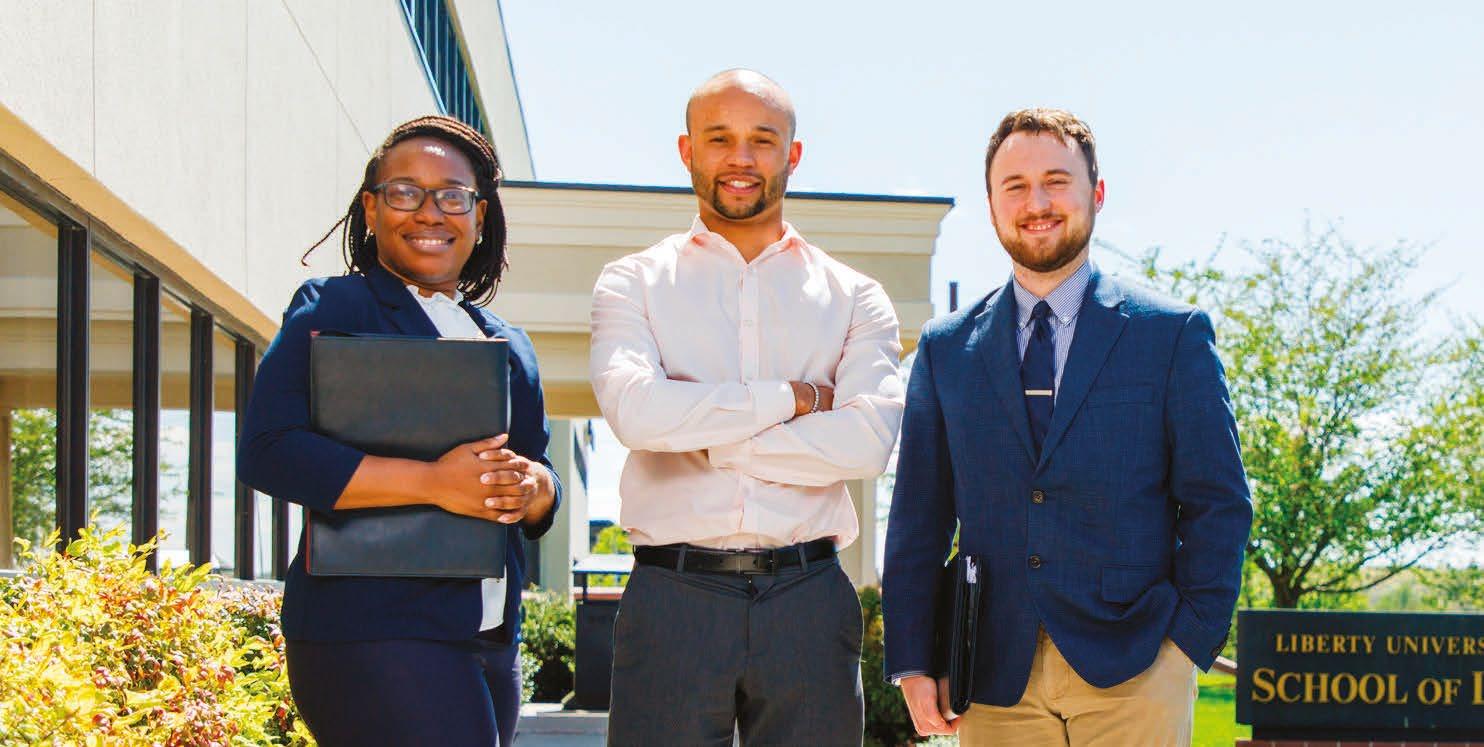
Three consecutive years of high bar passage rate for first-time takers:
Three consecutive years of high bar passage rate for first-time takers:
Three consecutive years of high bar passage rate for first-time takers: 95% (2018)
( July-Oct. 2020)
Three consecutive years of high bar passage rate for first-time takers:
2020)
Three consecutive years of high bar passage rate for first-time takers: 95% (2018) 92% ( July-Oct. 2020) 92% (2019)
2020)
592-6068
� LawCareer@liberty.edu
� (434) 592-6068
� Liberty.edu/Law
/LibertyUniversityLaw
92% (2019) INSPIRE THE PROFESSION. INNOVATE THE PRACTICE. IMPACT THE WORLD.
95% (2018) 92%
92% (2019) � LawCareer@liberty.edu � (434)
� Liberty.edu/Law /LibertyUniversityLaw
( July-Oct. 2020)
95% (2018)
92% (2019) IMPACT THE WORLD.
/LibertyUniversityLaw
92%
� LawCareer@liberty.edu � (434) 592-6068 � Liberty.edu/Law
IMPACT THE WORLD.
92% ( July-Oct.
92% (2019) INNOVATE THE PRACTICE. IMPACT THE WORLD. � LawCareer@liberty.edu � (434) 592-6068 � Liberty.edu/Law
95% (2018) 92% ( July-Oct.
92% (2019) INSPIRE THE PROFESSION. INNOVATE THE PRACTICE. IMPACT THE WORLD.
95% (2018) 92% ( July-Oct.
2020)


















































































































































































































































































































Take the first step today toward building equity in your brand, promoting your excellence and offering your audience more reasons to trust you. Contact EVG, and a member of EVG’s content licensing team will be happy to answer your questions and get you started. enveritasgroup.com You’ve Earned it... EnVeritas Group: creative licensing solutions for brands that earn accolades they deserve. A now Promote it! Enveritas is the exclusive reprints and logo licensing partner for North Carolina Lawyers Weekly Reprinted with permission of North Carolina Lawyers Weekly © 2021 AUGUST 25, 2021 NCLAWYERSWEEKLY.COM ■ BY HEATH HAMACHER A Wake County jury has awarded $3.41 million to a 23-year-old woman for sexual abuse she endured for nearly a decade. Ian Richardson of Vann Attorneys and Daniel Barker of Barker Richardson, both in Raleigh, report that their client, Moriah Taylor, was repeatedly sexually abused by her father, David Taylor, from the time she was 8 years old until she reported the abuse to her bishop when she was 17. Her mother, Toby Taylor, knew about the abuse and did nothing to stop it, Richardson said. Ordinarily, Lawyers Weekly does not divulge the names of victims of sexual abuse. But Richardson said that his client “wanted to shine a bright light on what happened, as she felt like when she was a child this was improperly swept under the rug by numerous people, including her mother.” “I think, at least for our client, there was something powerful about facing this situation head-on,” Richardson said. Court records show that David Taylor was convicted of attempted sexual battery in 2015, and Richardson said that David admitted to sexually abusing Moriah approximately five times, though Moriah claims she was abused “more times than she can count.” The suit alleged negligence and negligent infliction of emotional distress by Toby Taylor. Richardson said that Toby admitted to knowing that when Moriah and some of her sisters (David and Toby have 11 children together, Richardson said) were younger, David would call them into his home office “to inspect their breasts.” “Toby told [Child Protective Services] that she knew something was going on, but couldn’t put her finger on it,” Richardson said. Richardson said that David served just a few days in jail after pleading guilty to the offenses, time meted out only after he violated probation by contacting Moriah. “Therefore, we asked civil jury to hold both he and Toby Taylor accountable for what happened and impose a punishment consistent with the nature of the abuse,” Richardson said. David and Toby represented themselves at trial. After a three-day trial, the jury deliberated about four hours, Richardson said, before finding them liable on Aug. 19 and awarding Moriah $1,185,800 in actual damages and $2,225,000 in punitive damages. Nevertheless, Richardson said he considers it only “halftime” in the case, since David and Toby claim that they are too poor to pay the judgment. “But we have evidence that they own cryptocurrency and substantial precious metals,” Richardson said. “So now we’re going to go focus on collecting.” Follow Heath Hamacher on Twitter @NCLWHamacher Jury awards $3.41M to woman sexually abused by father VERDICT REPORT — SEXUAL ABUSE Amount: $3,410,800 Injuries alleged: Emotional distress and post-traumatic stress disorder Case name: Moriah Taylor v. David and Toby Taylor Court: Wake County Superior Court Case No.: 18-CVS-12294 Judge: Graham Shirley Date of verdict: Aug. 19 Demand: $1 million Highest offer: $25,000 Attorneys for plaintiff: Daniel Barker of Barker Richardson and Ian Richardson of Vann Attorneys, both in Raleigh Attorneys for defendants: None Barker Richardson AMANDA M. CUBIT Sodoma Law Union Monroe O all Amanda M. Cubit’s accomplishments so far in her career, serving on the board of Turning Point, Inc. has been her most important and rewarding. Turning Point, in Union County, serves survivors of domestic violence, sexual assault and child abuse. “The mission of this organization is close to my heart as frequently represent people who have been affected by domestic violence,” she says. Cubit, a family lawyer with Sonoma Law Union in Monroe, received her law degree from Charlotte School of Law in 2012 after graduating from Clemson University with Bachelor of Arts degree in political science. She started her career practicing with Legal Aid of North Carolina. She has happy memories of growing up near Philadelphia, where she enjoyed celebrating birthdays, holidays and important milestones with her parents, two younger siblings and extended family. “Family has always been the most important part of my life, and I would not be who am today without their love and support,” she says. If Cubit could have dinner with anyone of her choosing, it would be her grandfather. She had a close relationship with him, but he passed away when she was young. “There are many questions would love to ask him, and stories would love to hear now that am older,” she says. During the COVID-19 lockdown, Cubit became enthralled with the show “Below Deck” on the Bravo channel. She is still hooked and rarely misses an episode. “My brother is captain of a yacht, and the show gives me a look into how he spends his days,” she says. “It goes without saying that we lead very different lives.” RISING STARS 2021 Reprinted with permission of North Carolina Lawyers Weekly © 2021
















































































































































































































































































































































